










CANDLES
Havdala Candles
Yerushalayim / Maale Adumim 4:20 5:42 4:26 5:45 4:45 5:39 Aza area (Netivot, S’derot, Et al) 4:38
Beit Shemesh / RBS 4:39
Gush Etzion 4:36
Raanana/ Tel Mond/ Herzliya/ K. Saba 4:36
Modi’in / Chashmona’im 4:36
5:36
5:43 4:45 5:37
5:43 4:42 5:37
5:43 4:42 5:37
5:43 4:42 5:37
Ranges 11 days Wed - Shabbat Jan. 11-21 / 8-28 Tevet
Earliest Tallit and Tefillin 5:45 - 5:44
Sunrise 6:40 - 6:38
Sof Zman Kriat Shema 9:13 - 9:14
Magen Avraham 8:35 - 8:36
Sof Zman Tefila 10:04 - 10:06
(According to the Gra and Baal HaTanya)
Be’er Sheva 4:38
Rehovot 4:37
Petach Tikva 4:20
Ginot Shomron 4:35
Haifa / Zichron 4:24
Gush Shiloh 4:34
Tel Aviv / Giv’at Shmuel 4:36
Giv’at Ze’ev 4:35
Chevron / Kiryat Arba 4:36
Ashkelon 4:38
Yad Binyamin 4:37
Tzfat / Bik’at HaYarden 4:27
Golan 4:32
5:43 4:42 5:37
Netanya 4:36 5:44 4:44 5:39
5:43 4:43 5:38
5:43 4:26 5:37
5:42 4:41 5:36
5:41 4:30 5:35
5:41 4:41 5:35
5:43 4:43 5:37
5:42 4:46 5:36
5:43 4:42 5:37
5:45 4:44 5:39
5:44 4:43 5:38
5:39 4:33 5:33
5:39 4:38 5:33
Rabbeinu Tam (J'lem) - 6:14PM • next week - 6:20pm
TImes According to MyZmanim (20 min. before sundown in most cities, 40 min. in Yerushalyim and Petach Tikva, 30 min. in Tzfat/Haifa)
Chatzot (Halachic Noon) 11:47 - 11:50
Mincha Gedola (Earliest Mincha) 12:17-12:20
Plag Mincha 3:49-3:57
Sunset (Including Elevation) 4:59-5:07
Seymour J. Abrams • Orthodox Union Jerusalem World Center • Avrom Silver Jerusalem College for Adults • Wolinetz Family Shul • Makom BaLev • Birthright • Yachad • NCSY in Israel • JLIC in Israel • Pearl & Harold M. Jacobs ZULA Outreach Center • The Jack Gindi Oraita Program • OU Israel Kashrut
STUART HERSHKOWITZ, PRESIDENT OU ISRAEL Zvi Sand / Yitzchak Fund: Former Presidents, OU Israel | Rabbi Emanuel Quint z”l, Senior Vice President | Prof. Meni Koslowsky, Vice President


VAAD MEMBERS: Dr. Michael Elman | Moshe Kempinski | Sandy Kestenbaum | Norman Shmutter | Harvey Wolinetz RABBI AVI BERMAN, EXECUTIVE DIRECTOR, OU ISRAEL
David Katz, CFO, OU Israel | Chaim Pelzner, Director of Programs, OU Israel | Rabbi Sam Shor, Director of Programs, OU Israel Center Rabbi Sholom Gold, Dean, Avrom Silver Jerusalem College for Adults 22 Keren HaYesod <> POB 37015 <> Jerusalem 91370
phone: (02) 560 9100 | fax: (02) 561-7432 email: office@ouisrael.org website: www.ouisrael.org Founders and initial benefactors of the OU Israel Center: George and Ilse Falk a"h
OU Israel, Torah Tidbits does not endorse the political or halachic positions of its editor, columnists or advertisers, nor guarantee the quality of advertised services or products. Nor do we endorse the kashrut of hotels, restaurants, caterers or food products that are advertised in TT (except, of course, those under OU-Israel hashgacha). Any "promises" made in ads are the sole responsibility of the advertisers and not that of OU Israel, the OU Israel Center , Torah Tidbits.
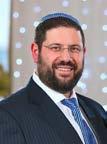
This Shabbat we will begin reading the book of Sh’mot after concluding the book of Breishit, during which we learned about the creation of the world, our Avot, Imahot, and the 12 tribes. An underlying theme throughout the book is, “Ma’aseh avot siman lebanim,” (the actions of our fathers guide our actions) meaning that the deeds of the Avot serve as signs for their descendants. And while we might not find ourselves tested with the schemes of a talking snake, building an ark during troubling times or navigating our way out a pit filled with snakes, the stories of our Avot demonstrate how to live as servants of HaShem. However, while stories can be an impactful educational tool, nothing can replace seeing values in practice. While my wife and I thoroughly vet the schools we send our children to, we know that formal classroom education alone will not be sufficient in
imbuing our children with the values we hold dear. Fortunately, both Pnina and I saw the mitzvah of Kibud Av v’Em (honoring parents) exemplified by our parents, who have continued to serve as role models for our children.
I was zoche to grow up with all four sets of grandparents - a zechut I didn’t fully appreciate until I made aliyah and was the only boy in my eighth grade class to have living grandparents on both sides. As part of a multi-generational family, I grew up with parents, aunts, uncles and grandparents, each of whom served as exemplary models of Kibud Av v’Em.

I was even fortunate to know my great grandmother who passed away when I turned 10 at the age of 97. My Grandpa’s devotion to his mother remains etched in my mind. Despite working long days as a roofer, Grandpa always stopped by his mother’s apartment on his way home, bringing her groceries and taking care of anything else she

needed. Of course, the model Grandpa set for his family was upheld by his own children whom I watched honor both him and my Grandma with the utmost respect.



My wife Pnina was blessed to grow up with two grandmothers in her life. One grandmother passed away 20 years ago. The other, Esther (Lisette) Kahn, survived the Holocaust with her sister after being miraculously taken off a transport to Auschwitz. Our children have been zoche to know their great grandmother, whom we fondly called Grand maman, and saw their grandparents exemplify the mitzvah of Kibud Av v’Em - particularly over the last 15 years when Grand Maman moved in with them. Despite the growing difficulty in her battle with Alzheimer’s, my children saw the devotion with which their grandparents took care of Grand Maman, and how Pnina and her siblings did the same.
On the sixth night of Chanukah, Pnina’s grandmother passed away, leaving behind a dignified legacy and flourishing family. 82 years ago Esther Kahn did not know if she would survive the Holocaust. Despite the horrors she faced and the family she lost in the war, Esther lived on to build a modest, meaningful life, and returned to her Maker at 97 years old. She left behind four children, 35 grandchildren, 207 great-grandchildren, and 9 great-great grandchildren. This is a tremendous blessing we do not take for granted. May the merit of our good deeds serve as an aliyah to her neshama. We miss her terribly.


Beyond the impact Grand Maman had on our family, we were blown away by the people who flooded the shivah house to pay their respects to the life she led - both in

Paris and in Israel. We were also surprised and deeply moved to meet people who lived in Grand Maman’s home in Paris, which she had opened up to Jews of all backgrounds once her children moved out of the house.
As Jews, we are taught to value the wisdom and guidance of our elders and must always remember the importance of Ma’aseh avot siman lebanim. My wife’s family was tremendously fortunate to have five living generations to learn from. I too was fortunate to learn from my grandparents, and great grandmother, and am grateful for the zechut I have to continue learning from my parents. As human lifespan extends with the advent of medicine, multi-generational families will become more common, providing us with a beautiful opportunity to learn from the values of our elders.
Whether we ourselves are personally blessed with these role models in our families,
can all learn and respect
around us. For our role models, thank you so much. We don’t take you for granted and recognize that the way you lead your lives full of value and worth emulating serves as a tremendous model for the younger generations.
May we see the opportunities put before us by the Borei Olam (Creator of the world), embrace the values we hold dear and live by them fully. May we be fortunate to build generations steeped in Torah, connected to one another and to our beautiful shared heritage.
Wishing you all an uplifting and inspiring Shabbat, Rabbi Avi Berman Executive Director, OU Israel aberman@ouisrael.org
OU Israel's Torah Tidbits extends its boundless gratitude to
Menachem
for well over a decade of writing a weekly Dvar Torah in our pages.

Your wisdom, original insights and inspirational messages brought meaning and joy to countless Shabbat tables and to tens of thousands of Jews throughout the world each week.
We wish you continued bracha and hatzlacha in all your endeavors and Avodat HaKodesh. Your commitment and devotion to OU Israel will be cherished for generations to come.
With love and appreciation, The staff of OU Israel's Torah Tidbits
and our next step will be to plant a fruit tree. I never thought of myself as being the agricultural type, but the feeling of settling and planting a portion of Eretz Yisrael, has been truly euphoric. Iy”H, when we plant our tree, and eat the fruits that will grow one day, I think we will be able to truly appreciate that unique Kedusha found in
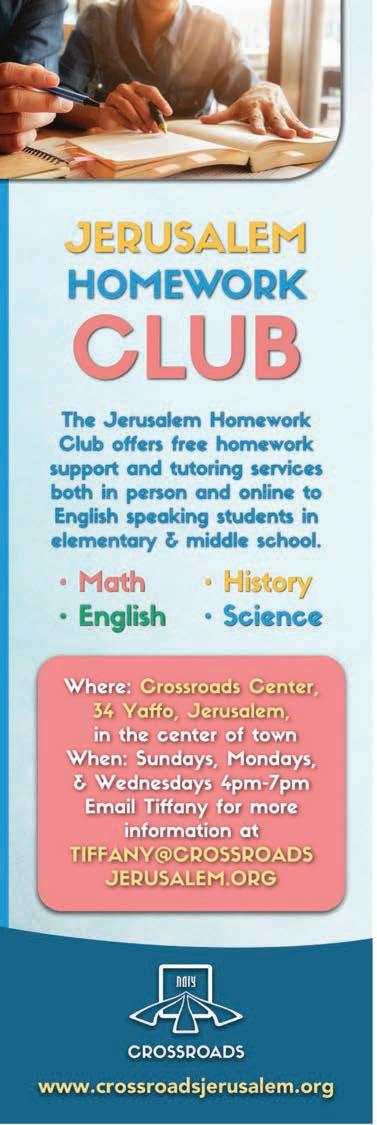


To conclude, when you buy your Tu B'shvat fruit this year, don’t search for those dried apricots and banana chips imported from Turkey. Rather, head over to the fresh produce and buy yourself some nice juicy Kedusha-filled Jaffa oranges and thank in , imbibing that Kedusha in every bite that



 OU Executive Vice President
OU Executive Vice President
At the beginning of the Parsha (1:8), our slavery in Egypt is described as beginning with the rise of a new king over Egypt, “who did not know Yosef.” Later in the Parsha, when Moshe approaches Pharaoh in G-d’s name to ask him to release the Jewish people (5:2), Pharaoh refuses, saying, “I do not know of Hashem.” The Midrash (Shemos Rabba 1:8) bridges these two verses, saying, “Today he does not know Yosef, tomorrow, he will not know Hashem.
נ"על
On this 10th yahrzeit of DAVID STAR z"l
Navy veteran, public school teacher, became shomer mitzvot, Aliyah in '84 to Maale Adumim, incredibly proud of scores of grandchildren learning Torah & in Sherut Leumi & the IDF and on this 29th yahrzeit of his first-born GLENN z"l (1952-1993)
who through 25 years of serious illness was a special-ed teacher and beacon of chessed In loving memory the Chupp, Feldbaum, Saracik and Star families
The message is clear. Yosef as a person always represented G-d and the G-dly. His initial success in the house of Potiphar came because G-d was visibly with him (Bereishis 39:2, 23). His ascension to the throne was a result of the Egyptians’ realization that they would not find anyone filled with G-d’s spirit quite like him (41:39). And when he governed, he did it as a G-d-fearing person (42:18).
One who knew Yosef, knew G-d.
As time went on in Egypt, we did not represent G-d as well and as consistently as Yosef had. The king that arose observed Yosef’s descendants but did not learn from them and did not see G-dliness in their ways. The king did not know Yosef.
When we, the children of Yosef, live our lives in a manner that represents Hashem properly, we will ensure that through our actions the world around us will come to know G-d. Each of us can and must live up to that standard of true faith, faithfulness, integrity, kindness, and pleasantness that will bring awareness and glory to G-d and fill the world with Kiddush Hashem.
Let each of us make sure that the world that will know us will thus come to know Hashem, allowing Him to liberate us from all the pain and the chaos that surrounds us. ןוצר יהי ןכ.
but you could possibly do them. For when it comes to communications from G-d, you are unique, irreplaceable, sui generis, one of a kind.


This exchange presents a fundamental principle of the Torah: that G-d speaks to Moshe in a way that He does not, nor will He in the future ever do again with anyone else. When Moshe says that people come to him seeking G-d, what he means is: I have access to G-d. He speaks to me. (Speaking to G-d isn’t the trick; the trick is when He answers back.) Similarly, when Moshe says that he teaches G-d’s law, what he means is that G-d communicates those laws to him and to no one else. This could very well be the prime purpose of this Yitro story. For, in the very next story, the giving of the Torah, the very same theme of Moshe’s uniqueness as the one to whom G-d speaks is central.

3rd aliya (18:24-27) Moshe heard. He chose judges, with only the most difficult cases brought to him. Moshe sent Yitro home. It takes an honest leader to accept suggestions to improve. Moshe displays his honesty and humility – if the suggestion is good, embrace it. Just as Yitro accepted the news of the Exodus and affirmed One G-d,
Keren Malki empowers families of children with special needs in Israel to choose home care. Donations are tax-approved in Israel, US and UK.


Honoring the memory of Malka Chana Roth ד”יה 1985-2001, killed in the Sbarro bombing.


The Jewish people are in Egypt. A new Paro is concerned with the size of the Jewish people. He decrees hard labor, infanticide and then actively drowning the male babies. Moshe is born, raised in Paro’s daughter’s home. After seeing the Jews mistreated, he flees to Midian, marries and settles there. At age 80, Moshe encounters the burning bush. G-d instructs him to go to Paro and demand, in G-d’s name, to free the Jewish people. Moshe, after attempting to refuse this mission, goes to Paro. Paro increases the burdens. The people complain.
1st Aliya (1:1-17) 70 Bnei Yisrael descend to Egypt. They grow exceedingly numerous, filling the land. A new king who knew not Yosef arises. Afraid that the Jews would join with enemies of Egypt, he seeks to weaken their numbers. A labor tax is followed by oppressive labor. Then the midwives are instructed to kill the Jewish babies. The midwives fear G-d and do not heed Paro’s directive.
The book of Sh’mot, of Exodus is radically different than Bereshit. Bereshit was the story of people: Avraham, Yitzchak
and Yaakov, Sarah, Rivka, Rachel and Leah. Then Yosef and his brothers. And overlaid to the story of people is the Divine refrain, “I give to you the Land promised to Avraham”. It is almost like a song with a chorus; each person is the verse, with the chorus of G-d’s promise of the Land repeated. Avraham and his life, with G-d’s promise repeated. Yitzchak and his family, with G-d’s promise repeated. Yaakov and then the Yosef story, with G-d’s promise repeated. In Bereshit the people are center stage, with G-d ever present but of few words; the repeated promise.
In Sh’mot G-d and man switch places. It is the story of Divine control of Jewish destiny. He is the Main Director, the Jewish people the mere stage actors. He no longer lurks, with repeated promises. He acts, dominates, controls, manipulates. He
In memoriam תמאה ןייד ךורב Muriel (Buchman) Goldman z"l widow of Louis Goldman z"l London, Hartford CT, USA, Ramat Eshkol & Alon Shvut
Passed away, thanks to 'ה, In fullness of years. Sadly missed by her children Rika & Zalman Deutsch, Simone & Matthew Simpson and Ian & Donna Goldman. Also her grandchildren David & Tzippy Deutsch, Aaron & Ilana Factor, Nechama Vairogs, Shoshi & Menachem Tennenboim, Meir & Adina Deutsch, Sari & Kobi Stein, Devorah & Elchanan Levi. Also her many great-grandchildren. םחוננ םילשורי ןיינבב [I want to thank Helen Buenaobra my devoted caregiver who I love as a daughter for helping 'ה to keep me going] * the message above was written by the deceased in advance Levaya was on Wednesday Jan 4th

initiates, communicates, commands. Later, at Sinai, He reveals Himself.

But His appearance begins only when we hit bottom.
Paro acts to weaken the Jewish people. Vicious actions, including murder. The midwives fear G-d, refuse to murder. There is no mention of G-d’s actions. We have seen this before. G-d’s name is absent from the sale of Yosef, as it is here. Spiraling downward we can do on our own. Man does a mighty fine job of cruelty all on his own. G-d appears when we hit bottom.

2nd Aliya (1:18-2:10) The midwives defend their actions to Paro. Moshe is born, placed in the water in a basket. Paro’s daughter rescues him. Miriam arranges for Moshe’s mother to nurse him. He is returned to Paro’s daughter and named Moshe.
When Moshe was born his mother “saw that he was good”. And he was placed in the water, albeit in a basket. Those 2 elements, water and “it was good”, immediately remind us of the first day of creation. In the beginning “the spirit of G-d hovered over the waters” (Genesis 1:2). And when light was created, “G-d saw the light and it was good.” Moshe’s being placed in the water and his mother “saw that he was good” could be the Torah’s way of saying there is a new creation story taking place: with Moshe’s birth, a new world dawns for the Jewish people.
3rd Aliya (2:11-25) Moshe matures. He goes out to see the travails of his brothers. He defends a Jew by killing his Egyptian aggressor, and then saves a Jew from a Jewish aggressor. He flees for his life to Midian,


aids Yitro’s daughters, is welcomed by Yitro, marries Zipporah, has a child Gershom. “For I am a stranger in a strange land”. G-d sees the suffering of the Jews and remembers his covenant with Avraham, Yitchak and Yaakov.
Moshe names his son Gershom, for “I am a stranger”. Which strange land is he referring to? Being a Jew in Egypt? Or being an Egyptian in Midian? Where is Moshe’s home?
The story to this point is the story of people; G-d has yet to appear. In a world without G-d’s presence, there are good people and bad people. Paro, evil. Midwives, good. Moshe’s parents, brave. Paro’s daughter, good. Moshe’s sister, altruistic.Egyptian slave master, cruel. Jews struggling, violent. Yitro, welcoming.
And Moshe? Goes out. Concerned. Helps those who need help. Feels angst; a stranger. G-d appears. His name appears 5 times in 3 verses. Everything changes now. Or perhaps not. All the human activity to this point; has He orchestrated it, or is it people doing what people do? Some good, some not? Or
mere puppets in the Hand of the Puppeteer?
4th Aliya (3:1-15) Moshe and the burning bush. Moshe, Moshe, Hineni. G-d speaks, Moshe cowers. G-d tells him: I have seen the suffering of My people. I will save them from Egypt and bring them to the Land of milk and honey. I am sending you to go to Paro and he will release my people from Egypt. Moshe objects: who am I to go to Paro? And the Jewish people will question who sent me. G-d says: tell them the G-d of their forefathers, Avraham, Yitzchak and Yaakov sent you.
The entire story of the Torah changes here. G-d moves from the unseen force behind human action to directly dictating human activity. He tells Moshe that He will take the Jewish people out of Egypt and bring them to the land of Israel. Up until now, the Jewish people have been promised the Land but have lived only with the promise, not with its fulfillment. They have not seen the Hand of G-d but have rather detected it behind the events. As Yosef said “G-d has brought me to Egypt to save the family.” He never heard that. He peered behind the veil and detected it.
Now the veil is drawn. Moshe is told in vivid detail exactly what will transpire. The Jews will be sent out by Paro. The story of the Exodus from Egypt is a pillar of Jewish belief because it is a blatant, direct display of G-d’s Hand in our history. It is His Hand in full display, not behind the veil.
5th Aliya (3:16-4:17) G-d continues: Gather the people. Tell them that I will take them to the Land. They will listen. Go to Paro. I know he will not listen. I will smite the Egyptians.
You will be loaded with gold, silver and clothing from the Egyptians. Moshe is still convinced that the people will not believe him. G-d gives him signs: staff turns to snake and then back, hand turns leprous and then back. And water to blood. Moshe objects: I am not a good speaker. G-d says: I give speech to man. I will send Aharon with you. He will speak. Take your staff.
Moshe’s reluctance is striking. Avraham did not demur from a pretty rough command to sacrifice his son. Noach didn’t either when given a command that would bring derision. Moshe is a very begrudging leader. But that itself is instructive. Moshe is not a man driven by a mission, a great, charismatic leader who leads his people from oppression to freedom, displaying the power of human will in the face of injustice. And after all, he is 80, a rather late start on leading his people.

The charismatic leader leading his being from slavery to freedom would be a great story. But it is not our story. Our story is of the Divine Hand guiding human events through a reluctant leader. This is not Moshe’s story. It is the Divine’s. And even that great refrain “let my people go” is not Moshe speaking. It is rather “let My people go”. It is Moshe quot ing G-d to Paro – he is but the messenger.
6th Aliya (4:18-31)
Moshe gets Yitro’s blessing to return to Egypt. G-d tells Moshe that those seeking his death have died. G-d tells him to tell Paro: G-d says Israel is my first born. Send out

tions of Yishmael are enumerated. Yishmael dies. Hisous and powerful offspring. The brevity


and began father’s that his icant the
BY RABBI Rav, BeitMy son, for if you do not, I will slay your first born. Zippora circumcises her son. Aharon greets Moshe. They gather the people. The people believe that G-d will redeem them.
G-d adds one more thing to Moshe; Israel is My first born. As if to say – “Moshe, this is a story of love. I view the Jewish people as my beloved first born.” And. Refusal by Paro will result in Divine punishment. Our western ethos is uncomfortable with these central principles of Judaism: G-d’s Hand in history, G-d’s love for the Jewish people, and Divine punishment. As Rabbi Sacks, z”l, said; Radical then. Radical now.


7th Aliya (5:1-6:1) Moshe and Aharon approach Paro, requesting a 3-day journey to the desert to celebrate. Paro refuses. He increases the workload. Conflict arises between the Jewish workers and the Egyptian supervisors. The Jews criticize Moshe for increasing their burden. Moshe complains to G-d. G-d reassures him that through a strong hand, Paro will send them out.
What a great lesson: even when G-d promises, don’t think it is all clear sailing. His promises run smack into the uncomfortable reality of human beings. The plan
for the Jews to leave runs into the reality of Paro and his resistance. Paro derails the plan, at least in part. That is the lesson: man meanders as the Divine plan unfolds, up and down, forward and back. But resistance need not dull the end. The end will come. Maybe later than sooner. But a Promise is a Promise.
This week’s haftorah echoes the reading of this week’s parsha of Sh’mot on a number of levels.
One of the connections to the parsha is the message of redemption which is stated by the prophet Yeshayahu - “and you shall be gathered one by one, O children of Israel.” This sounds very similar to the message of Hashem to Moshe, communicated at the Burning Bush.
Although the haftorah emphasizes the future redemption of Israel, it also spotlights certain admonitions concerning the Jew’s wayward behavior and disloyalty to God.
On a positive note the prophet exclaims: “And it will come to pass on that day that
a great shofar will be sounded, and those lost in land of Assyria and those exiled in the land of Egypt will come, and they will prostrate themselves before the Lord on the holy mountain in Jerusalem,”
The haftorah ends on a soaring note: “Now Jacob will no longer be ashamed, and now his face will not pale. For when he sees his children, the work of my hand, in his midst, who shall sanctify My name... and the God of Israel they will revere.”
13th of 54 sedras; 1st of 11 in Sh’mot Written on 215.2 lines in a Torah (18th) 7 parshiot; 6 open, 1 closed 124 p’sukim - 15th (tied with Emor) 1763 words - 14th (Emor: 22nd) 6762 letters - 16th (Emor: 23rd) 2nd in Sh’mot in those three categories

No mitzvot are counted from Sh’mot. One of 17 sedras without mitzvot.
In this week’s parsha we learn about certain episodes in Moshe’s early life before the Exodus. From all that is described in the text, we are told 3 circumstances that took place.
1/ “And he saw an Egyptian man smiting a Hebrew man ..and he smote the Egyptian (2:11,12)

2/ “And he said to the wicked one: why do you smite your fellow?” (2:13)
3/ “ And the shepherds came and drove them away; but Moshe stood up and he helped them, and he watered their flock.” (2:17
Why must we learn of these three different interventions?
Rabbi Avraham Sabah (1440-1508 Spain during Expulsion) claims that in these three instances we see Moshe intervening to stop injustice to prove a CHAZAKAH – a “tenure” of always stopping exploitation and therefore truly worthy to become our leader.
The Yalkut Shimoni is quoted that the three cases are necessary to illustrate Moshe’s character. The first instance Moshe reacts saving a fellow Israelite. One would think Moshe only protects a Jew from a non-Jew. The second instance Moshe reacts between two Jews. Perhaps, Moshe gets involved when a Jew is involved. Finally, we are told that even in a case of two non-Jews fighting, Moshe still intercedes to protect from abuse. This is our Moshe Rabbeinu. Shabbat Shalom


The two old men couldn’t have been more different from each other. Yet they both taught me the identical life lesson.
The first, a cagey old Irishman, was one of my mentors in the postgraduate psychotherapy training program in which I was enrolled many years ago. He wrote quite a few books in his day, but they are all out of print now and nearly forgotten, like so many other wise writings
The other was an aged Rabbi, several of whose Yiddish discourses I was privileged to hear in person. He was moderately famous in his lifetime, but is much more well-known nowadays because of the popularity of his posthumously published writings.
The lesson was about the importance of time management. Neither of these two elderly gentlemen used that term, which is of relatively recent coinage. Yet their words, while far fewer than the words of the numerous contemporary popular books on the subject of time management, made a lifelong impression upon me.
It was long after my encounter with these elderly gentlemen that I first realized that their lesson was implicit in a verse in this week’s Torah portion, Parshat Shemot.
The Irishman, we’ll call him Dr. McHugh, was a master psychotherapist with fifty years of experience under his belt. A small group of us gathered in his office every Tuesday evening. We went there not only for his wisdom, but for the warm and comfortable furnishings and splendid view of the city of Washington, D.C.
Dr. McHugh was an existentialist philosophically. He was heavily influenced by his encounters with Martin Buber, and because of this, he felt a special affinity to me, thinking that since Buber and I were both Jewish, we must have had much in common. He wasn’t aware that my Judaism was very different from Buber’s, but I wasn’t about to disabuse him of his assumption.
He was a diligent and persistent teacher and, true to his philosophical perspective, doggedly encouraged us to appreciate the human core of the patients we were treating. He was convinced that he had a foolproof method of comprehending that
human core. “Tell me how the patient uses his time, how he organizes his daily schedule, and I will tell you the secret foundation of his soul.”
Dr. McHugh firmly believed that you knew all you needed to know about a person if you knew how he used his time. Or, as he put it, “if he used his time, and how he used it.” He would then make his lesson more personal, and would ask, carefully making eye contact with each of us, “How do you busy yourself?”

In the summer following that postgraduate course, I took advantage of the rare opportunity of hearing the ethical discourses, the mussar shmuessen, of the revered Rabbi Elya Lapian. He too spoke of the fundamental importance of one’s use of time, and he too, though he did not even know the term, was quite an existentialist.
He began his remarks quietly, almost in a whisper. Gradually his voice reached its crescendo, and when it did, he uttered the words I will never forget: “Der velt sagt,” he said in Yiddish, “the world says that time is money. But I say time is life!” I was a young man then, but not too young to appreciate the profound meaningfulness of that simple statement. Time is life.
He went on to say that we all allow ourselves to become busy, and busyness

“A man who goes through life without taking the time to consider his ways is like a blind man who walks along the edge of a river…
detracts from life.
It was quite a few years later that it dawned upon me that the Irish psychiatrist and the Jewish spiritual guide were preceded in their teaching by the 18th century ethicist and mystic, Rabbi Moshe Chaim Luzzato, known by the initials of his name as the Ramchal. Furthermore, the Ramchal was preceded in antiquity by none other than the Pharaoh himself.
In the second chapter of his widely studied ethical treatise, Mesillat Yesharim, Path of the Upright, Ramchal writes of the tactics of the yetzer, the personification of the evil urge which is buried within each of us:
“A man who goes through life without taking the time to consider his ways is like a blind man who walks along the edge of a river… This is, in fact, one of the cunning strategies of the evil yetzer, who always imposes upon men such strenuous tasks that they have no time left to note whether they are drifting. For he knows that, if they would pay the least attention to their conduct, they would change their ways instantly…
“This ingenuity is somewhat like that of Pharaoh, who commanded, ‘Let the heavier work be laid upon the men, that they may labor therein, and let them not regard lying

words’ (Exodus 5:9). For Pharaoh’s purpose was not only to prevent the Israelites from having any leisure to make plans or take counsel against him, but by subjecting them to unceasing toil, to deprive them also of the opportunity to reflect.”
To become so busy and have no time to reflect, no time to really live, is bondage. Ramchal’s insight into Pharaoh’s scheme epitomizes the essential nature of our years of exile in Egypt. To have no time, that is slavery.
How prescient were the words of Rav Elya Lapian. Time is life. And how germane is his teaching for contemporary man, who despite the “time-saving” technological devices which surround him is even busier than those who came before him. Contemporary man has no time for himself, certainly no quality time, and thus no life.
Time is life.
Millennia ago, an Egyptian tyrant knew this secret.
Centuries ago, an Italian Jewish mystic was keenly aware of it.
Decades ago, I learned it from a Gentile existentialist psychiatrist and a gentle and pious rabbi.
It is the secret of spiritual time management, and it is the secret of life.
















Genesis ends on an almost serene note. Jacob has found his long-lost son. The family has been reunited. Joseph has forgiven his brothers. Under his protection and influence the family has settled in Goshen, one of the most prosperous regions of Egypt. They now have homes, property, food, the protection of Joseph, and the favour of Pharaoh. It must have seemed one of the golden moments of Abraham’s family’s history.
Then, as has happened so often since, “There arose a new Pharaoh who did not know Joseph” (Ex. 1:8). There was a political climate change. The family fell out of favour. Pharaoh told his advisers: “Look, the Israelite people are becoming too numerous and strong for us”1 – the first
1 Ex. 1:9. This is the first intimation in history of what in modern times took the
time the word “people” is used in the Torah with reference to the Children of Israel.
“Let us deal shrewdly with them, so that they may not increase” (Ex. 1:9–10). And so the whole mechanism of oppression moves into operation: forced labour that turns into slavery that becomes attempted genocide.
The story is engraved in our memory. We tell it every year, and in summary form in our prayers, every day. It is part of what it is to be a Jew. Yet there is one phrase that shines out from the narrative: “But the more they were oppressed, the more they increased and the more they spread.” That, no less than oppression itself, is part of what it means to be a Jew. The worse things get, the stronger we become. Jews are the people who not only survive but thrive in adversity.
Jewish history is not merely a story of Jews enduring catastrophes that might have spelled the end to less tenacious groups. It is that after every disaster, Jews renewed form of the Russian forgery, The Protocols of the Elders of Zion. In the Diaspora, Jews –powerless – were often seen as all-powerful. What this usually means, when translated, is: How is it that Jews manage to evade the pariah status we have assigned to them?

themselves. They discovered some hitherto hidden reservoir of spirit that fuelled new forms of collective self-expression as the carriers of God’s message to the world.


Every tragedy begat new creativity. After the division of the kingdom following the death of Solomon came the great literary prophets, Amos and Hosea, Isaiah and Jeremiah. Out of the destruction of the First Temple and the Babylonian exile came the renewal of Torah in the life of the nation, beginning with Ezekiel and culminating in the vast educational programme brought back to Israel by Ezra and Nehemiah. From the destruction of the Second Temple came the immense literature of Rabbinic Judaism, until then preserved mostly in the form of an oral tradition: Mishnah, Midrash, and Gemara.
From the Crusades came the Hassidei Ashkenaz, the North European school of piety and spirituality. Following the Spanish Expulsion came the mystic circle of Safed: Lurianic Kabbala and all it inspired by way of poetry and prayer. From East European persecution and poverty came the hassidic movement and its revival of grass-roots Judaism through a seemingly endless flow of story and song. And from the worst tragedy of all in human terms, the Holocaust, came the rebirth of the State of Israel, the greatest collective Jewish affirmation of life in more than two thousand years.
It is well known that the Chinese ideogram for “crisis” also means “opportunity.” Any civilization that can see the blessing within the curse, the fragment of light within the heart of darkness, has within it the capacity to endure. Hebrew goes one
better. The word for crisis, mashber, also means “a child-birth chair.” Written into the semantics of Jewish consciousness is the idea that the pain of hard times is a collective form of the contractions of a woman giving birth. Something new is being born. That is the mindset of a people of whom it can be said that “the more they were oppressed, the more they increased and the more they spread.”
Where did it come from, this Jewish ability to turn weakness into strength, adversity into advantage, darkness into light? It goes back to the moment in which our people received its name, Israel. It was then, as Jacob wrestled alone at night with an angel, that as dawn broke his adversary begged him to let him go. “I will not let you go until you bless me,” said Jacob (Gen. 32:26). That is the source of our peculiar, distinctive obstinacy. We may have fought all night. We may be tired and on the brink of exhaustion. We may find ourselves limping, as did Jacob. Yet we will not let our adversary go until we have extracted a blessing from the encounter. This turned out to be not a minor and temporary concession. It became the basis of his new name and our identity. Israel, the people who “wrestled with God and man and prevailed” (Gen. 32:28), is the nation that grows stronger with each conflict and catastrophe.
I was reminded of this unusual national characteristic by an article that appeared in the British press in October 2015. Israel at the time was suffering from a wave of terrorist attacks that saw Palestinians murdering innocent civilians in streets and bus stations throughout the country.

It began with these words: “Israel is an astonishing country, buzzing with energy and confidence, a magnet for talent and investment – a cauldron of innovation.” It spoke of its world-class excellence in aerospace, clean-tech, irrigation systems, software, cyber-security, pharmaceuticals, and defence systems.2
“All this,” the writer went on to say, “derives from brainpower, for Israel has no natural resources and is surrounded by hostile neighbours.” The country is living proof of “the power of technical education, immigration, and the benefits of the right sort of military service.” Yet this cannot be all, since Jews have consistently overachieved, wherever they were and whenever they were given the chance. He goes through the various suggested explanations: the strength of Jewish families, their passion for education, a desire for self-employment, risk-taking as a way of life, and even ancient history. The Levant was home to the world’s first agricultural societies and earliest traders. Perhaps, then, the disposition to enterprise was written, thousands of years ago, into Jewish DNA. Ultimately, though, he concludes that it has to do with “culture and communities.”
A key element of that culture has to do with the Jewish response to crisis. To every adverse circumstance, those who have inherited Jacob’s sensibilities insist: “I will not let you go until you bless me.” That is how Jews, encountering the Negev, found
2 Luke Johnson, ‘Animal Spirits: Israel and its tribe of risk-taking entrepreneurs,’ Sunday Times, 4 October 2015.
Jerusalem Real Estate is My Business Eta: 054-723-3863 Rachel: 052-546-6425




Amazing stand alone homes in OLD KATAMON, TALBIYA, BAKA, GERMAN COLONY
Allenby Complex. Across from BAKA. 160 sqm penthouse quiet with views. 4 bedrooms & 2.5 bathrooms. Shabbat elevator, sukka terrace from living room plus roof top terrace 2 parking & storage. 6,400,000 NIS
Yemin Moshe beautiful property over 300 sqm. 2 private entrances (complete separate unit over 90 sqm). large garden. Close to parking & gorgeous architectural design newly renovated. Call for more info

In the heart of BAKA enclosed in a magical courtyard: 3 bedrooms 2 full bathrooms one flight up. Beautiful spacious sukka terrace facing open gardens Completely renovated with architectual design & high level finishes. 6,250,000 NIS
Penthouse near BAKA. 154 sqm on one floor with 4 bedrooms and 2 full bathrooms. Shabbat elevator, 2 underground parking and 3 storage units!!! 25 sqm Sukka terrace off living room plus large roof top terrace. 6,250,000 NIS

Eta Morris Realty, Ltd. etamorrisrealestate@gmail.com
Eta: 054-723-3863 · Rachel: 052-546-6425 etamorrisrealty.co.il
ways of making the desert bloom. Seeing a barren, neglected landscape elsewhere, they planted trees and forests. Faced with hostile armies on all their borders, they developed military technologies they then turned to peaceful use. War and terror forced them to develop medical expertise and world-leading skills in dealing with the aftermath of trauma. They found ways of turning every curse into a blessing. The historian Paul Johnson, as always, put it eloquently:
Over 4,000 years the Jews proved themselves not only great survivors but extraordinarily skilful in adapting to the societies among which fate had thrust them, and in gathering whatever human comforts they had to offer. No people has been more fertile in enriching poverty or humanising wealth, or in turning misfortune to creative account.3
There is something profoundly spiritual as well as robustly practical about this ability to transform the bad moments of life into a spur to creativity. It is as if, deep within us, a voice was saying, “You are in this situation, bad though it is, because
3 Paul Johnson, The History of the Jews, London, Weidenfeld and Nicolson, 1987, p. 58
there is a task to perform, a skill to acquire, a strength to develop, a lesson to learn, an evil to redeem, a shard of light to be rescued, a blessing to be uncovered, for I have chosen you to give testimony to humankind that out of suffering can come great blessings if you wrestle with it for long enough and with unshakeable faith.”
In an age in which people of violence are committing acts of brutality in the name of the God of compassion, the people of Israel are proving daily that this is not the way of the God of Abraham, the God of life and the sanctity of life. And whenever we who are a part of that people lose heart, and wonder when it will ever end, we should recall the words: “The more they were oppressed, the more they increased and the more they spread.” A people of whom that can be said can be injured, but can never be defeated. God’s way is the way of life.
These weekly teachings from Rabbi Sacks zt”l are part of his ‘Covenant & Conversation’ series on the weekly Torah teaching. With thanks to the Schimmel Family for their generous sponsorship, dedicated in loving memory of Harry (Chaim) Schimmel. Visit www.RabbiSacks.org for more.









Over these years, I have endeavored to uncover the less obvious messages and themes found in the haftarah reading and, by doing so, reveal more subtle connections between the parasha and its haftarah. There are times, however, that simply understanding the text itself can be the most challenging task. That is certainly true of this week’s haftarah.
Attempting to understand what the navi Yishayahu was trying to relate to the people in the 27th and 28th prakim (setting aside the last two p’sukim that are taken from chapter 29), is a rather difficult undertaking. Even the opening words are hard to comprehend. The first pasuk reads as follows (translation by Rabbi A.J. Rosenberg of the Judaica Press):
“Those who came, whom Jacob caused to take root, Israel flourished and blossomed, and they filled the face of the world with fruitage.”
Yes. A most difficult challenge.
And so, we will to try to find the meaning of these verses, based primarily upon the approach of Rav S.R. Hirsch and, hopefully, uncover the message that the navi shared with Israel.
The haftarah, which begins in the middle of the 27th perek of Sefer Yishayahu and continues into the 28th chapter (before its closing message from the 29th perek) delivers Hashem’s message to the suffering Israel. In its opening section (perek 27) the navi explains how the punishments that the nation received were, in reality, a path to their return and growth. The opening verse that appears so difficult to comprehend, is actually a promise to Ya’akov that she would recover from Hashem’s chastisements, telling the people that, in the future, Jacob would take root and blossom, filling the world with her “fruits”. The navi points out that Israel’s punishments of exile and oppression were less harsh than those visited upon her enemies, whom G-d had completely destroyed. Yishayahu goes on to comfort the nation by explaining that their suffering would atone for their sins.
It is, perhaps, this very message that our Rabbis saw as a connection to the parasha, where we read of Israel’s bondage in Egypt, a suffering would lead to their entry into the Promised Land. In fact, that connection is made clear in the final verses of the 27th perek which depicts the future gathering
of the exiles from the Diaspora and their return to the land.
The second part of the haftarah, the first 13 p’sukim of the 28th perek, is a section of contrast. Rather than continue on the previous theme of comfort and hope, this section opens with condemnation, censuring the sinful northern kingdom of Ephrayim and predicting its downfall. Continuing that same theme, the navi also denounces the southern kingdom for their sinful ways and argues that their infantile understanding of Hashem, viewing the Torah as a simple list of one command following another and, therefore, failing to see the mission of the Jew makes it impossible to properly educate the people in the ways of G-d.
I would surmise, that Rav Hirsch saw in this depiction of the sinful nation, a nation condemned by Yishayahu, as being similar to the ancient Israelites who, while enslaved in Egypt - and even during their early years in the desert - were unable to fully believe in G-d or completely understand Hashem and His commandments.
This approach would certainly help us understand why our Rabbis chose to end the haftarah with the comforting words in the following perek, words of reassurance, telling Israel that, just as they overcame the doubts of their early years and, trusting in G-d, erased the shame of their past and marched triumphantly into their land –so too would the Israel of the future erase the shame of their exile and, trusting in G-d, would return triumphantly to their land.
And, hopefully, we too may soon see that.
Eiferman Properties
Presales and immediate occupancy, BUILDINGS AND VILLAS
In the most desirable neighborhoods
SHAAREI CHESSED / RECHAVIA
Prime Apartments! Prime Location!
1) Renovated 110 sqm 3 bedroom apt, 1st floor, A/C + underfloor heating, 3 air exposures, succah balcony NIS 6,500,000 2) Beautifully designed 125 sqm 3 bedroom apt + 50 sqm succah balcony. Shabbat elevator, parking and view. 3) Architecturally designed 228 sqm duplex penthouse, 4 bedrooms + 30 sqm succah balcony. Shabbat elevator, parking and a view.
FOR MANY MORE PROPERTIES:

In this week’s parsha we are introduced to Moshe Rabbeinu, of whom we are told: דוע השמכ לארשיב םק אל – no one ever reached Moshe’s stature. Aside from being a great leader, we are told in Parshat Beha’alotcha: המדאה ינפ לע רשא םדאה לכמ ונע השמ שיאהו -This man Moshe was exceedingly humble, more so than any person on the face of the earth. (Bamidbar 13:3). At Moshe’s first encounter with Hashem we witness his modesty. In Parshat Shemot when God first appears to Moshe, out of humility Moshe covers his face (ו:ג תומש ויָנָּפ הֶׁשמ רֵּתְסַּיַו ).
There is a dispute in the gemara (Berachot 7) whether Moshe’s reaction of covering his face was commendable. According to Rav Yehoshua Ben Karcha Moshe was later punished for his reaction. When Moshe requests to understand God’s ways (Shemot 33:13) Hashem declines and states when I appeared to you, you covered your face, now that you want to see me, I will cover my face – וארי אל ינפו (Shemot 33:23). Rav Shmuel Bar Nachmani argues that Moshe’s reaction is praiseworthy, and he was rewarded by Hashem revealing
himself to Moshe in a manner that no other profit merited. וב רבדא הפ לא הפ (Shemot 12:8).
We can derive an important lesson from this dispute. Although it is important to be humble, there is a time when one ought to step up to a challenge and refrain from unjustifiable humility. Perhaps Moshe quickly internalized this message as well. Although he felt he was not worthy of leading the Jewish people, after Hashem convinced him to accept the task, he did so wholeheartedly. Moshe confronted Pharaoh with confidence and conviction. Although he thought little of himself, when it came to representing the Jewish nation, he stood with prowess and pride.
Once in that position, one should constantly evaluate whether they are acting for the good of the people they are representing or out of any self-motivation
Some interpret a humble individual as someone who is quiet, unassuming and someone who minds his own business. Moshe proves his thesis false! One can be modest and very much involved, and in fact even serve in a leadership position.
Humility is perhaps defined not by the feeling of self-worth but rather by the impetus of one’s action. Moshe acted out of humility because his motivation was solely for the benefit of the nation, and not for any personal gain or recognition.
more about patient self-control than physical might. It is found in the Talmudic tractate Kiddushin 40a, where the tale is told about a certain Rabbi Zadok, who resists the attempts of a particularly powerful noblewoman to lead him astray. He exerts moral strength, and to him the Talmud applies the following biblical verse: "Bless the Lord, O His angels, mighty creatures who do His bidding, ever obedient to His bidding. Bless the Lord, all His hosts, His servants who do His will." (Psalms 103:20-21)
At times people decline offers to serve as leaders of Jewish institutions, claiming that they are not worthy or qualified to serve in such prestigious positions. As with Moshe Rabbeinu, one should carefully contemplate whether they are fit to serve in such a capacity and if they indeed are the most suitable to fill such a position, they should accept the offer in a respectful manner. Once in that position, one should constantly evaluate whether they are acting for the good of the people they are representing or out of any self-motivation.
Isaac's way recognizes the necessity for great patience and forbearance. If we adopt Isaac's way, we must be prepared for a lengthy process before our challenges are resolved. In the words of Rabbi Abraham Isaac Kook, words which have been memorialized in a popular song, "An eternal people does not fear the long and arduous path."
Exclusive!
www.angelrealty.co.il

For Sale in The Village, Zayit, Eftat Stunning 210m 8 room cottage, 2 private parking spots, central A/C. 4,800,000 NIS
Beautiful, spacious 4 room luxury unit, 2.5 baths, 2 oor, Shabbat elevator, large succa terrace, storage + covered parking.
For Sale in Dagan, Efrat Stunning 8 room cottage, middle unit. 3 floors, 230m. 5,250,000 NIS For Sale in Gefen, Efrat Beautiful 5 room duplex garden 2,850,000 NIS For Sale in Dagan, Efrat 5 room garden apt. 120 meters 2,990,000 NIS For Sale in Olive Project, Zayit, Efrat Gorgeous 4 room apt. 120m. 2,850,000 NIS For sale in Zayit, Efrat 6 room duplex apt. 2,850,000 NIS Contact Gabi for more info 0524588716
Rehavia-Talbieh on quiet Radak May the Torah learned from this issue of TT be in loving memory and נ"על our dear parents whose yahrtzeits are in Kislev Doris Weinberger

SHELLY LANDAU PROPERTIES

& EVA AVIAD REALTY bayitsheli@gmail.com www.aviadrealty.com 052-385-9944 • 054-499-9043

May all our leaders, in the political, religious and communal realm act with true humility without any selfish agenda or personal gain. May all those capable of serving in that manner step up to the plate with the proper humility and use their God given talents to serve Hashem and the community. As we recite each Shabbat during tefillat Musaf ה”בקה הנומאב רובצ יכרצב םיקסועה לכו םרכש םלשי – All who engage in communal activity, will be rewarded by the Almighty.
Patience is necessary for those who follow Isaac's way. But a wise woman taught us that patience is but another name for hope. That woman was Jane Austen, who put these words into the mouth of one of the characters in her great novel, Sense and Sensibility: "Know your own happiness. You want nothing but patience—or give it a more fascinating name: call it hope."
Greatly missed by their children, grandchildren and great grandchildren Rav Aryeh and Dvora Weinberger Bernie and Leah Weinberger Menachem and Hannah Katten


The beginning of Sefer Shemot is quite perplexing. The Torah lists the names of Yaakov Avinu’s children of who accompanied him down to Egypt, information that we already know from Sefer Bereisheet 46;8-26. What is the significance of recounting the names once again? Further, why is the entire second book of Torah titled Shemot, referencing names?
Rav Munk offers an explanation based on the well-known Midrash which teaches that the Jewish people merited redemption since they maintained their Hebrew names. A name is not merely a technical detail to distinguish one person from another. A name reflects one’s essence and serves as a connection between an individual and Hashem. Rav Pincus notes that a boy is named at his brit, a covenant between the child and Hashem. Similarly, a girl is traditionally named after her father
gets an aliyah to the Torah, also called “Sefer Habrit.” Here too, this deep connection between the child and Hashem is reflected in her naming.
A finer look at the story of the two Hebrew midwives gives us a deeper insight into the power of a name as a means of spiritual connection. Rabbi Brazil in Bishvili Nivra Haolam, posits that Paroh insisted that the midwives be called by Egyptian names. He hoped that having an arbitrary identification would allow them to look at themselves, as well as the infants they delivered, as random numbers, not as individuals with meaning and purpose. Paroh calculated that this attitude would enable the midwives to kill the babies as they were born since they would relate to the babies as dispensable and meaningless. A Jew, however, is always a name and never a number. The Torah begins listing the names of the Shevatim before mentioning how many they were, highlighted this
integral element of Jewish identity. Rabbi Brazil adds that connecting to the spiritual essence of one’s name protects him or her from outside influences. Thus, we have Sefer Shemot. The book of redemption is predicated on faith and loyalty to the power and implication of a name.

It is noted in Midrash Rabbah, that the names of the Shevatim foreshadowed the process of redemption. For example, the name Shimon reflected, “Hashem heard their cries.” (Shemot 2;24) Listing the names of the Shevatim, says Rav Elyashiv, echoes the people’s hope and faith that they would be redeemed. Preserving their Jewish names, then, demonstrated their firm belief in the power of those names, the deeper belief in their deliverance from Egyptian bondage, that they were forever bound to the Guardian of Israel.
Names have multiple meanings that allow every individual to draw out their different strengths depending on the situation. Rav Gifter in Pirkei Torah uses this concept to explain the repetition of Yaakov’s family at the end of Sefer Bereisheet and the beginning of Sefer Shemot. The list in Bereisheet were the names of the Shevatim as they thrived in Eretz Yisrael. Recording their names once again in Shemot illustrates that they developed singular, extraordinary strengths that allowed them to survive in galut as well.
Each of us is challenged to develop ourselves through the various circumstances that we face in life, continually drawing out deeper aspects of self. When we continually grow and develop, we find that we can access redemption.
From its humble beginnings in the shtetl of Mir, Belarus, to fleeing to Shanghai and relocating in Yerushalayim — for more than 200 years — the Mirrer Yeshivah has been a center of Torah learning and personal development. A scion of the Mirrer Yeshivah leadership, Rav Nosson Tzvi Finkel, zt’l, had arrived there as a teenager from Chicago. After thirty years of learning, he finally assumed the position of Rosh Yeshivah in 1990. He was an unparalleled masmid and showed almost superhuman resilience and determination in learning and spreading Torah, even while facing the challenges of severe Parkinson’s disease for much of his adult life.
Through his efforts, guidance and care the Yeshivah grew five times larger, becoming the largest center of Torah in the world. Today, a visitor to the Yeshivah will be met by the roar of thousands of voices of learning, recital and holy debate, like an enormous lion of fierce spiritual power. In addition to teaching and maintaining personal relationships with countless talmidim, the Rosh Yeshivah shouldered the financial responsibility of the entire enterprise, and became one of the greatest builders of Torah and Yidishkeit in modern Jewish history.
Once, while at a wedding of a talmid at a hotel in Bayit Vegan, Jerusalem, Rav Nosson


Tzvi heard that the hotel’s rooftop lounge offered a sweeping view of the entire city. Excitedly, he asked to go upstairs and take a look. Although in his advanced stages of Parkinson’s disease, each and every step was a challenge, he threw incredible effort into walking, and after much time he arrived exhausted at the elevator. As he rested, a student accompanying the Rosh Yeshivah sought to understand his Rebbe’s intent: since when was he so interested in the view?
Smiling ear to ear, Rav Nosson Tzvi explained, “Didn’t you hear? Yeshivas Knesset Yisrael, ‘the Chevron Yeshivah’, is expanding their campus in Givat Mordechai! I’ve been davening for its successful completion for so long. I want to see their progress!”
At the time, Rav Nosson Tzvi was wrestling with heavy debt from his own ambitious building projects and expansions — on top of the overwhelming financial burden of the many Mirrer institutions. Yet, he rejoiced triumphantly at the sight of another yeshivah’s success.
After the tragic fratricide story of Kayin Hevel, Sefer Bereishis goes on to detail the
heart-wrenching conflicts between Yishmael and Yitzchak, Eisav and Yaakov, and Yosef and his brothers. Only after leading us through these painful, adversarial and dysfunctional sibling rivalries, the Torah brings us to Sefer Shemos, the account of our redemption. Here begins the account of tikun, the antidote to all those negative patterns and broken family relationships.
In our sedra, as Moshe ascends to the leadership of Am Yisrael, he feels uncomfortable; perhaps his older brother, Aharon, would feel slighted. But the Ribbono shel Olam assured Moshe that he need not be concerned:
But he said, “Please, My God, send through whomever You will send…make someone else Your agent…”
Hashem became angry with Moshe and said, “There is your brother Aharon…He, I know, speaks readily. Even now he is setting out to meet you, and he will be happy to see you.”
(Shemos, 4:13-14)
A literal translation of the last phrase is “He will see you, and rejoice in his heart.” Rashi confirms that Aharon was genuinely happy for his brother, and celebrated his success. Midrash Rabba says, ויה הז תלודגב הזו ,הז תלודגב הז ןיחמש, “They would both rejoice in one another’s greatness (achievements).”
Together, Moshe and Aharon are role models of brothers who complement one another and work together. They had the admirable midah of firgun — a trait of

genuine, unselfish delight and pride in the accomplishments of the other.
דַחָי־םַּג םיִחַא תֶבֶׁש םיִעָּנ־הַמּו בֹוּט־הַמ הֵּנִה
“Look, how ‘good’ and how ‘pleasant’ it is when brothers dwell in unity!”
(Tehillim, 133)
Here, בֹוּט, “good”, refers to Moshe, as when he was born, his mother “saw that he was good.” Likewise, םיִעָנּ, “pleasant”, refers to Aharon, who reconciled alienated spouses and friends. As the Kohein, Aharon blessed all with Shalom, leaving a trail of pleasantness wherever he went.
Moshe wished for his older brother Aharon to lead, while Aharon deferred to his younger brother, Moshe. They covered for one another and wished one another success. Rebbe Shimon bar Yochai reveals that in merit of Aharon’s firgun, rejoicing over his brother’s achievements, he
merited to wear the Urim v’Tumim, the breastplate of the Kohein Gadol: חמשש בלה חמשיו אובי ויחא תלודגב, ‘The heart that rejoiced over the greatness of his brother was given the joy of being adorned with the breastplate upon which was inscribed the names of all of Am Yisrael.”
It is no mistake that our Redemption from Egypt manifested through two brothers who worked together in harmony. They had different roles but they considered each other equals, not competitors. And this is a lesson for us as well: when we are confident in ourselves and comfortable with our role in the world, we can be m’fargein, happy that our brothers and friends are successful. Rambam, in Sefer haMitzvos (206), defines firgun as a core Jewish value: “Whatever I wish for myself, I should wish the same for that person.”
Old Katamon: 4-room apartment in a small and quiet street, 101 sqm, renovated, very bright and airy, master bedroom, Safe room (mamad), sukkah balcony, view, elevator, 3,400,000 NIS
Old Katamon: 4-room apartment, 90 sqm, well split, bright, airy, sukkah balcony facing a magnificent panoramic view, 3 exp Shabbat elevator, parking, 3,290,000 NIS
BAKA: 4 room apartment, 82m, storage, elevator, needs renovation 3,000,000 NIS
KATAMON: new project, 2-3 room apartments, starting from 1,750,000NIS 4-5 room apartments starting from 3,200,000 NIS All apartments are fully accessible with parking & storage
Old Katamon: Spacious 3-room apartment in a very quiet street, 75 sqm, sukkah balcony facing a green and pastoral view, 3 exp. Shabbat elevator, private parking, storeroom, 2,690,000 NIS
OLD KATAMON: 4-room apartment, 94m, balcony, open view, Shabbat elevator, fully accessible, private parking, 3,290,000 NIS

RECHAVIA: 4-room apartment, 92m, Suka balcony, Shabbat elevator, fully accessible, private parking, storage 4,400,000 NIS
BAKA: 5-room garden apartment, 140m, master suite private parking, storage, full of light and airy, nice garden, 5,250,000 NIS

OLD KATAMON: Spacious new 5-room penthouse, 155m, terrace overlooking a great panoramic view, underfloor heating, full of light, Shabat elevator, 2 parking spots, rental unit, asking price 9,000,000 NIS
FOR RENT: BAKA: Charming 4-room apartment, 95m, architecturally renovated to a high standard, underfloor heating, air conditioners, third floor, view, 7,300 NIS
BAKA: nice 4-room apartment, 82m, beautifully renovated, air conditioners, Second floor, elevator, storage, 7,000 NIS
Reb Yerucham Levovitz in Da’as Chochmah u’Mussar, notes that the greatest among us can be swept up in jealousy and stink-eye. Indeed, how challenging it is to not become ensnared in some subtle form of rivalry, and to fully and sincerely rejoice in one another’s success. But this points to the exalted level of Aharon and why he is one of the most beloved holymen in our history.
May we be elevated above the perception of inner lack which drives jealousy and competitiveness, and may we climb to see the awesome panoramic view of the ‘goodness’ and ‘pleasantness’ of our people. May we celebrate one another’s achievements and successes, and in this way wear the ‘breastplate of Aharon’, inscribed with the name of every Jew, upon our hearts.












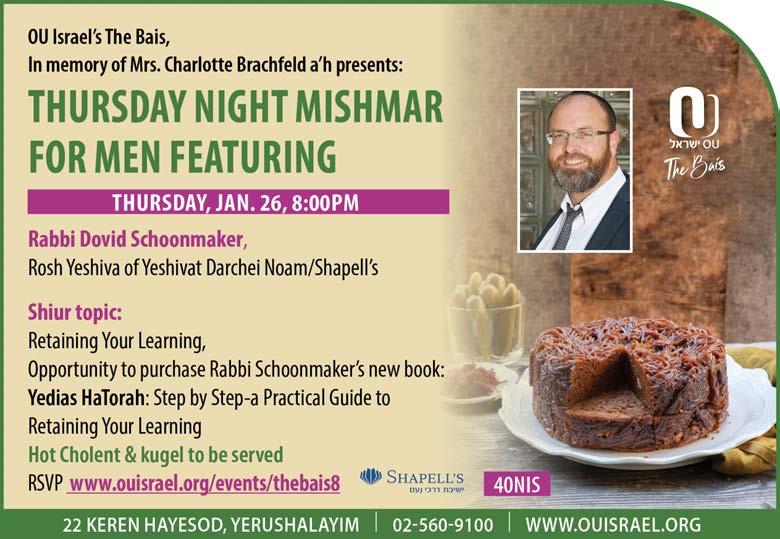
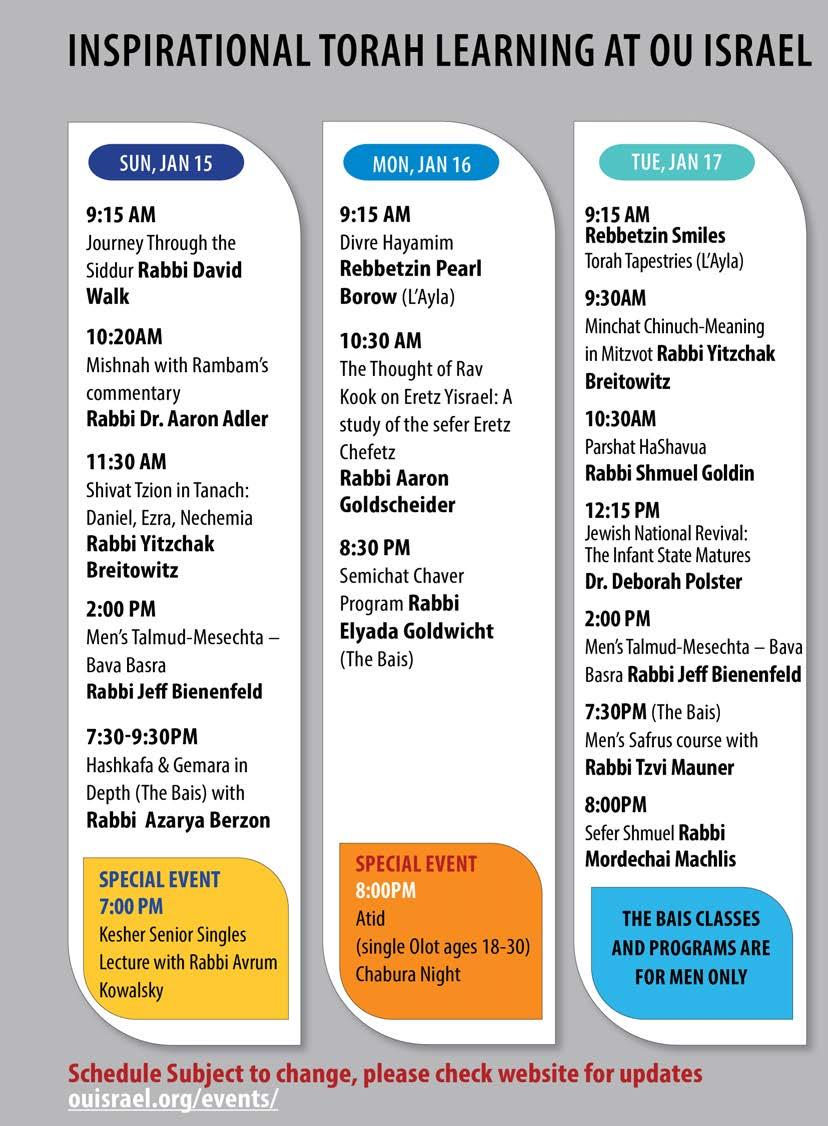





















Monday, January 9 - Rabbi Goldscheider’s shiur is sponsored in loving memory of a dear son L’iuli nishmat Yisrael Radin ben Avraham z”l
Tuesday, January 10 - Rabbi Goldin’s shiur was sponsored by Malka Abrahams in memory of her late mother, Chaya Rachel bas Mordechai v’Masha a”h and in memory of Malka’s late aunt Chava bat Avraham v’Sara a”h
All learning Wednesday morning, Jan. 18 is sponsored by Estelle Harris in gratitude to Hashem for her improved health
Rabbi Goldscheider’s shiur has been sponsored for the 2023 Academic Year ל’’ז המלש ןב בוט םשו ה’’ע םהרבא תב םירמ תמשנ וליעל
Rebbetzin Shira Smiles shiur is sponsored for the 2023 academic year by Dr. & Mrs. Menachem Marcus in memory of their parents, Rose & Dr. Emanuel Marcus z”lל”ז סוקרמ השמ ןב יכדרמו ריאמ ףסוי תב לזייר Rosi and Ernest Strauss z”lל”ז סוארטש דוד ןב לאינדו םהרבא תב דומיל
Rabbi Breitowitz’s Tuesday Shiur - Minchat Chinuch is sponsored for the academic year 2023 by Rabbi Refoel & Sharon Auman in memory of their parents Edith & Reiner Auman z”l ד”יה לאפר תב ה”ע רתסאו ל”ז קודצ ןב הנוי and their son Rabbi Shmuel Eliyahu Auman z”l י”נ לאפר ברה ןב ל”ז והילא לאומש ברה
Rabbi Goldin’s shiur is sponsored for the 2023 academic year by Dr. & Mrs. Menachem Marcus in memory of beloved aunts Irma Haas a”h and Hilde Myer a”h
Rabbi Manning’s shiur has been sponsored for the 2023 academic year ל’’ז ןמלק ןב גילזו ה’’ע תידנרב תב הנרב תמשנ יוליעל
Rabbi Taub’s weekly Thursday Parshat HaShavua Shiur is sponsored by The Jewish Legacy Foundation

Our sedra introduces us for the first time to Moshe Rabbeinu .The Torah describes Moshe’s birth, his clandestine early weeks of infancy, and his being sent down the Nile to be adopted by Paroh’s daughter, to be raised in the palace of Egypt.
The Torah describes in unusual language the birth of Moshe Rabbenu : ּוהֵנְּפְצִּתַֽו
The woman conceived and bore a son; and when she saw that he was good, she hid him for three months.
Rashi, quoting the Gemara in Sota, explains the words Vateira Oto Ki Tov Hu - And She saw that he was good - When he was born the whole house became filled with light.
The great Chasidic Master, the Yismach Moshe zy’a, offers a further insight into the meaning of our verse. The Rebbe explains from the time of his birth it was clear that he was kulo tov, only good, and that he was destined for greatness.
However, it is easy to see from the various pesukim describing the early years of Moshe Rabbeinu’s life, that very little detail is given to those formative years in the royal court of Egypt.
The Ibn Ezra,in a brilliant insight points out that Moshe’s trajectory for young lad on the Nile, to royalty, to redeemer all come to demonstrate that Hashem’s ways are truly deep and beyond our comprehension, but perhaps Hashem orchestrated these
events so that indeed Moshe would grow up as a nobleman rather than a slave, in order that he should be prepared for his sacred task! Not only would it instill Moshe, with knowledge and confidence, but so too had he grown up a slave, among his brethren, perhaps Klal Yisrael might have been unable to accept him as a leader, if he had simply been a slave as everyone else.
What looks at first glance to be the complete opposite course of preparation one might imagine for the greatest of Jewish leaders, in reality sets the stage perfectly for Moshe Rabbeinu to become who he is truly destined to be.
There is a dual musar haskel inherent in this insight from the Ibn Ezra. First and foremost, that Hashem’s ways are truly beyond our comprehension, and that ultimately Hashem orchestrates the course each of us are destined to traverse. But equally important is the notion that Moshe’s seemingly less than conventional journey to assume the mantle as our greatest leader and teacher, should inspire within each of us- that no matter our background, no matter our individual journeys, we too can achieve greatness, we too can excel and reach the highest echelons of Limud HaTorah and Avodat Hashem.
May we each merit to learn from this powerful teaching from the Ibn Ezra , and may each of us indeed be inspired to see the potential for greatness innate within each of us.






Initially hesitant to accept such an ambitious mission, Moshe was finally persuaded by Hashem that, despite his speech impediments and his unusual humility, he was best suited to release the chosen people from their brutal Egyptian servitude.
Invigorated by his assignment, Moshe gathers his possessions, assembles his small family, and begins the arduous journey back to Egypt. Suddenly, the unexpected occurs, and it almost ends in tragedy. Hashem encounters Moshe in his hotel ותימה שקביו ’ה והשגפיו and intends to kill him. Hastily, his wife Tziporah circumcises their son, saving both her husband and child from becoming “spouses of death” or תולומל םימד ןתח.
The Torah doesn’t specify Moshe’s error but, evidently, it was related to his son’s milah. The gemara in Nedarim (31b) elaborates by documenting the difficult quandary Moshe faced, which caused his almost-fatal error. Appreciating the urgency of his historical mission, Moshe realized that any delay in his arrival to Egypt would result in additional casualties. Yet, Moshe hadn’t circumcised his son, and
the recovery process from milah would ground him for a few days, since a post-milah baby would be too weak to travel. Moshe was torn by the severe dilemma whether to advance redemption at the cost of his child’s milah, or proceed with milah, thereby delaying the liberation and costing Jewish lives. He could not be in two places at once, and he found himself in a bind.
Facing this critical dilemma, Moshe delayed milah and began his journey to Egypt. Though his decision to delay milah was approved, his behavior upon arrival at a hotel could not be justified. A stayover at a hotel presented him an opportunity to expedite the neglected mitzvah of milah. His wife and children could remain in the hotel for a few extra days to recover from milah, and subsequently, they could rejoin him in Egypt. Though presented with a golden opportunity, Moshe still postponed the Milah until he had settled his family, and for this procrastination he was almost punished...until his wife corrected his error, took quick action, and avoided catastrophe.
Surprisingly, Moshe doesn’t receive a free pass for a slight delay in attending to his son’s milah. After all, Moshe was preoccupied with a great historical mission and his slight postponement could be rationalized based upon his focus upon the grand mission. Yet, despite the apparent “excuse”, Moshe’s mission screeches to a halt and is
only relaunched once his child is circumcised. Redemption cannot proceed without milah.

By introducing new features to religious identity, redemptive experience can become disorienting. The panoramic process of partnering with Hashem in shaping Jewish history can shift attention away from mitzvah observance and halachic integrity. It is more pleasant to view ourselves as partners of Hashem than servants who submit to divine commandments. Partnership with Hashem in history-building is enchanting and empowering, while compliance with mitzvot and obedience to the divine will requires submission of human freedom, which is always less appealing. Tantalized by redemptive fervor, we become enthralled with our historical role, but less attentive to our traditional profile of “eved Hashem’’ or servant of G-d. Redemptive euphoria must be coupled with halachic fidelity.
The midrash portrays a similar issue facing us on the eve of our ultimate redemption from Egypt. Primed for Exodus we were, nonetheless, bereft of mitzvot, and redemption could not advance without core commandments to brace religious identity. Correcting this imbalance, Hashem delivered several Pesach-night mitzvot such as korban Pesach, matzo, and marror, to provide halachic scaffolding for our euphoric flight of freedom. The exultant march from Egypt in the morning could not have proceeded without an earlier nighttime submission to mitzvot.
For this same reason, Moshe’s delay of the mitzvah of milah can’t be overlooked,




simply because he is advancing redemption. Condoning this oversight would set a terrible precedent, that mitzvah observance can be waived or reduced to meet the larger and more important goals of redemption. Delaying milah to save a child’s life is excusable, delaying because of redemptive preoccupation is not. The process must be halted to assure proper calibration between geulah and halachic observance.
Our generation is struggling with that very balance. We have all tasted the sweet toxin of redemption and, for many, it has expanded religious consciousness and imbued Torah study and mitzvah performance with added historical resonance. This is redemptive energy at its best.
For some, however, redemption has distracted from mitzvah observance, as historical opportunity has become too inspiring and too exhilarating. Lightheaded with redemptive excitement and endowed with historical influence, it has become more difficult to self-define as servants who dutifully worship and who are completely dependent upon a Higher being. It may take some time until our people learn to fully calibrate between the seductive whisper of redemption and the heavy but glorious yoke of mitzvot. Even Moshe had a momentary lapse in his own calibration.
Slavery isn’t just physically abusive but is also psychologically destructive. Slavery dehumanizes individual identity and scrubs away historical legacy. Decades of slavery left us with only a faint recollection of our Avot, unhinging us from their legacy. Facing this vacuum of identity, Moshe
was worried how to describe Hashem to a historically ignorant population. Responding to his concern, Hashem instructed Moshe to portray Him as -היקא רשא היקא the G-d of their past who will continue to supervise their welfare in the present and future.
Before they can be redeemed, the historically dismembered slaves must reconnect with their past heritage and view redemption not as an isolated political revolution but as part of a larger historical arc. They must learn that the same Being who forged a covenant with their ancestors has now returned to redeem them. They must learn that redemption is part of an ancient covenant between Hashem and the Avot, centered upon our national mission to represent Him in our world. Sometimes that mission requires exile in a foreign land under taxing conditions, but the covenant also guarantees ultimate redemption. Redemption, unframed by history, is hollow. The Icon of Covenant
What could possibly reconnect a band of dispirited slaves with their larger history of covenant? Obviously, the mitzvah of milah, the most vivid symbol of our covenant. Sadly, though, this symbol of Jewish covenant had fallen into neglect under the dreadful conditions of Egyptian persecution. Most of the population were unable to circumcise, and slowly, the Jews became unaware of the covenant, historically disengaged, and therefore unsuited for redemption.
Ironically, Moshe’s own milah was clouded in ambiguity. Even though he was born into the tribe of Levi, which maintained milah, it is unlikely that his milah
was a public event. Survival under the genocidal regime of Pharaoh, depended upon secrecy, and public milah ceremonies were, obviously, out of the question. Chazal mention that Moshe was born circumcised, meaning he did not undergo any milah procedure. Either way no one was aware that this man, who had been raised in an Egyptian palace, had been circumcised. It was therefore crucial that Moshe perform a public milah to associate the people with their historical covenant. They cannot be redeemed until their consciousness of covenant is restored. Awareness of their covenant must be generated by a public milah ceremony. Redemption cannot begin until Moshe circumcises his son.

By fixating our vision upon the future, redemption sometimes obscures the past. We look forward with excitement, and forget to look backward for legacy. The abrupt shift from exile to triumph and redemption can shade the past in pathetic terms. Sadly, many original secular Zionists were embarrassed by the “Jews of exile” who were seen as weak and pitiful. 1948 was a radical shift in history and it wasn’t easy to look backward when moving forward so quickly.
As the generation is invited to the era of redemption, we must “look back” to our covenant, its founders and the people who preserved it during darker times. As we emerge from the tunnel of history, we must deeply identify with those who traveled through the tunnel never seeing the radiant light at its end but preserving our faith and courage. Without the past, history is nonexistent. Without history redemption is hollow.
 BY MENACHEM PERSOFF Special Projects Consultant, OU Israel Center menpmp@gmail.com
BY MENACHEM PERSOFF Special Projects Consultant, OU Israel Center menpmp@gmail.com
A recurring question when reviewing our Parsha is why we suffered in Egypt some 3,500 years ago. Nechama Leibowitz summarizes several approaches to this thorny issue, not so much from a geopolitical perspective but from a theological, moral stance.
1. The calamity resulted from sin, the people’s desire to assimilate. Bnei Yisrael had arrived in Egypt as temporary dwellers – but no! “Yayeshev” – ‘they settled there’; “Vaye’echazu” – ‘they secured a permanent foothold!’ (Bereishit 47:27).
Moreover, following the Midrash, the people abrogated Brit Milah. They also left Goshen to settle the entire country (“the land was filled with them” - Shemot 1:7) – so much so that Hashem had to look for the blood smeared on the Jewish doorposts during the plague of the Firstborn! For the Midrash, the punishment was not so much a consequence of the Egyptians resenting the Israelites invading their economic and cultural life as Hashem’s turning his love for the people to hatred for their not wishing to be a people apart.
2. The exile and suffering were didactic tools. The punishment was corrective in the spirit of “He who spares the rod hates his
son…” (Mishleh 13:24), suggestive of what happened to King David’s son Avshalom who rose against his father. Perhaps this would explain why David further declared, “Happy is the man you chaste and instruct in Your Torah” (Tehillim 94:12).
3. Exile and suffering refine and purify one’s character, as declared by Yeshayahu (48:10): “Behold I have refined you not with silver; I have chosen you out of the furnace of affliction.”
4. The exile in Egypt taught us a long-standing moral lesson, as indicated in the following: “Do no wrong to the stranger and do not oppress him for you were strangers in the land of Egypt” (Shemot 22:20). Before the formation of our nation, it appears that we were to experience the taste of slavery and humiliation that would everlastingly refine our ethical and moral compass.
Finally, Baruch Hashem, we are no longer slaves to Egypt or any other nation. But we nevertheless recall that Bnei Yisrael “are My servants… whom I brought out of the land of Egypt. I am the Lord your God” (Vayikra 25:55).
***
And with this thought, dear readers, I conclude over a decade of “Divrei Menachem” to make way for the new generation of writers in Torah Tidbits.
Shabbat Shalom.




Join me as we explore themes and ideas of our prophets through their words in the weekly Haftorah. Each week we will take a closer look at a particular verse or theme, taking messages from our past to impact our tomorrow.
YESHAYAHU 27:6 - 28:13 29:22-23
This week’s Haftorah is not connected to the parsha in an obvious way. Our parsha primarily focuses on the descent of the Jewish people into Egyptian slavery and the rise of Moshe as their leader. The navi’s major emphasis is on the downward spiral of the kingdoms of Ephraim and Yehuda.
The Navi Yeshaya describes how the Jewish people will fail to properly study, observe and live the Torah. He famously decries a time when the Torah will have to be taught to them:
“Commandment by commandment and commandment by commandment, measuring line by measuring line and measuring line by measuring line, a bit here and a bit there.“
Prima facie, this seems positive, not negative. It would seem that for us to learn the Torah commandment by commandment, line by line and bit by bit, would be a way to assure that we study the Torah in its
entirety and get to know all of its minutiae.
Rav Kook observes that the Torah is supposed to be understood, appreciated and lived in a holistic manner. When we engage in halachic reductionism and slice and dice the Torah into teeny bits we fail to appreciate the scope of its grandeur and the depth of its eternal truth. Yeshaya bemoans a generation that is not only ignorant of Torah information, but more importantly of its beauty.
The connection of Yeshaya to Shemos is now more obvious. The Jews in Egyptian times had not yet received the Torah and had nothing to turn to for inspiration and encouragement. The generation of Yeshaya had it, but did not look to it for guidance.
We are blessed to have the Torah. We must study and observe it carefully. We must also look at its greatness to guide us in times of difficulty and despair. May we always value the magnificence of the Torah and merit to see the fulfillment of the beginning of the Haftorah: לבת ינפ ואלמו לארשי חרפו
“Days are coming when Yaakov will take root, Yisroel will bud and blossom and fill the face of the earth like fruit.”
Hello, I'd appreciate your professional response. Do you think that a secular professional who performs a psycho-dyagnostic evaluation on a chareidi young man may receive inaccurate results (on a cognitive or emotional level) because of his distance from the cultural world of the boy?



In general it is hard for me to properly address this broad question since you didn't include any descriptive information regarding the boy, his age, and the purpose of the evaluation, obviously without disclosing the boys identity. There is no one right answer for all such cases. One can say that sometimes a secular psychologist is preferable and in other cases a chareidi one is more appropriate.
I'll try to address the general dilemma. It's a complex issue. The components of our minds are similar, as we are all human beings, whether chareidi or secular. A lot of research has been done regarding the influence of cultural differences on results of research. One can say that generally the evaluation tests are supposed to be objective and not culturally biased.
Nonetheless, since we are human and the evaluation is after all performed by humans and not by computer, there certainly can be an influence of the evaluator's identity, his cultural background and more. This influence may be expressed in a number of aspects:






1. Interpreting the test results. I'll explain through an example of an intelligence test. This test includes, in addition to other things, questions involving worldly knowledge which a chareidi boy may not be aware of. As that is the case, knowledge or lack of knowledge of this information may influence the intelligence mark this boy may receive and may convey an inaccurate picture of even
deeper levels involving more inner, mental levels of the boy.

2. Different norms and manners of interaction. During the evaluation, one's thought process is expressed and evaluated as well. The manners of interaction in the chareidi world in often different and in order to understand the meaning of the content and manners of interaction one must understand the way these differ in the chareidi world. Only then may one apply it to the inner mind of the subject.



3. The evaluation's significance. The connection between the evaluation's results and the reality of the person tested, meaning the environment in which the chareidi subject grew up and to which he continues to need to adapt himself, is different from that of the secular subject. The required strengths and skills, and pressures encountered, are different. Being acquainted with the culture allows a proper connection to be made between the inner world revealed through the evaluation and the real world. It would also obviously have a direct influence on the concrete recommendations given; for example, regarding a question about suitable educational settings, and more.
4. The connection between the evaluator and subject. There may be an advantage or disadvantage to having a secular evaluator in such a context. It is possible that a secular evaluator may allow the chareidi subject to feel more open and free about sharing his inner world, though the opposite can be true as well. In summary, the human mind is complex and every specific question may have various answers. I believe there are others who may view this difference differently. In any case, have a lot of s your endeavors and may the evaluation propel you forwards in the direction that is right for you!
Provided by Kav L'Noar in partnership with Lamerchav.‘In Eretz Yisrael the letters of our souls enlarge, expose the light, draw nourishment from the splendor of life of Knesset Yisrael.’ (Eretz Chefetz 2:3)

The topic of the holy letters is one of the deepest subjects of the “secrets of Torah” and enjoys a special place in the writings of Rav Kook. In 1917, while he was stranded in London during the First World War, Rav Kook wrote a volume entitled Reish Millin on the letters of the Aleph- Beit. It is known as one Rav Kook’s most esoteric works. It is overtly Kabbalistic in nature. It is a treatment of deeper meanings within the Hebrew letters.1
Perhaps the following citation from the Talmud can help us elucidate the obscure idea of “letters”: ‘When I [Rav Meir] came to Rabbi Yishmael, he said to me, ‘My son, what is your occupation? ‘ I told him, ‘I am a scribe’, and he said to me, ‘Be meticulous in your work, for your work is the work of heaven - perhaps you will omit one letter or add one letter; you would thereby destroy the entire world’ (Eruvin 13a).
Rashi elucidates the meaning of this passage above. Rashi explains that if one were, for example, to leave off the letter aleph in the phrase, “The Lord our God is true (emet) - rendering it as met, dead, - this would be a blasphemous statement like no other.”
With the aforementioned teaching in mind perhaps, Rav Kook is asserting that the soul of the Jew living in the Land is suited to perceive more perfect and all encompassing truths. “Letters” symbolize the basic structure and underpinnings of an elaborate system.
1 One example from this volume is the analysis of the meaning of the letter chet. It is made up of two zayins (weapons). These two letters symbolize a face off with one another. However, the letter chet also consists of a bridge that connects the two. The letter chet is equal to the number eight. In the world of perfection (eight) competing values and perspectives are synthesized and connected as a unified whole. (See Rosh Milin, Samson, pp. 50-51)
The notion that the letters represent the very composition of the Torah is conveyed in a penetrating teaching in the Talmud. The episode of Moshe smashing the tablets is generally understood as a deliberate, premeditated act on the part of Moshe. However, the Talmud Yerushalmi offers an alternative explanation. It was not Moshe’s will to throw down the tablets. We are told that the letters engraved upon the tablets miraculously vivified and flew up into the
air. Unable to support the deadweight of the stones, Moshe dropped them, causing them to shatter:
“Rabbi Ezra in the name of Rabbi Judah of the house of Rabbi Simon: The tablets weighed forty se’ah and the writing supported them. Once the writing flew off, the tablets became heavy upon the hands of Moshe, and fell and shattered.” (Yerushalmi Ta’anit 4:5)
Apparently, the letters represent the essence of Torah. When the Jewish people had turned aside, the letters, so to speak, had no place to reside on earth and therefore ventured back to heaven.
Rav Kook may also be alluding to another facet regarding the notion of “letters of the soul.” Namely the notion of simplicity. In Chassidus the letters of the Aleph-Beit symbolize purity and innocent faith. The following tale is a beautiful example of this: Rabbi Menachem Mendel of Kotzk spent his younger years in the town of Gorah and Tomoshav before settling in Kotzk. Once, after he had already achieved a level of renown, the Rebbe had occasion to return to his hometown. Many of the town’s scholars and saints, as well as its simple folk, came out to greet the revered Kotzker Rebbe. Much to the chagrin of some of the older scholars, upon his arrival, the Kotzker decided to take up lodging with his cheider rebbe. Feeling slighted, one of the rabbis who had taught Talmud to Reb Menachem Mendel asked in a derogatory tone why the tzaddik had chosen to stay “at his kindergarten teacher.” Kotzker answered: “Everything I learned from my Talmud teacher is but one possible reading of a given passage.

The only thing I am absolutely certain about is that the letters of the Aleph- Beit are indeed the letters of the Aleph-Beit.” (Oros HaTorah, Vol. 1, Weinberg pp. 375-376)
Rav Kook writes in Orot HaTorah (5:2): “The joy that Torah study engenders in a person derives from the abundant light contained within the letters of the Torah…”
The midrash on Shir Hashirim associates the letters of the Aleph-Beit with joy: “Rabbi Avin began, “This is the day that the Lord made, we exult and rejoice in it (bo) (Tehillim 118:24). We did not know over what to rejoice…until Shlomo Hamelech came and specified, “Let us exult and rejoice in You (bach)” (Shir Hashirim 1:4)... Rabbi Yitzchak said, “In You (bach) refers to the twenty two letters of the Aleph-Beit that You wrote for in the Torah: beit=2, kaf=20 , this is bach.”
To encounter the letters is to encounter Hashem. Perhaps the midrash above is accentuating complimentary ideas regarding our relationship with Hashem. The simplicity of a child who can only read the letters and the one who descends into the depths of the mysteries of God’s existence. For Rav Kook, the Land of Israel has the singular qualities that are most beneficial for such sacred encounters.
An “enlarged soul” is apt term to describe the soaring spirit and aliveness of Rav Kook’s essence. The following story
A small Sefer Torah with its own Aron Kodesh is available to shiva houses or for any other necessary occasion on a temporary free-loan basis. If needed call Uri Hirsch 0545513173
accentuates this quality. Rabbi Charlop, his trusted friend related this experience: “In the summer of 1921, the Rav went to rest in Har Tov. I visited him there and our private conversation extended to the wee hours. The next morning I noticed that the Rav did not arrive immediately to Shacharit. What’s more, totally out of character of the Rav (who was punctilious not to engage in any activity before prayer), I saw him approach the innkeeper and begin to discuss with him botanical matters, such as which trees to plant in the vicinity. Only after concluding the conversation, did he proceed to pray.
The delay and the incongruous conversation made me wonder, and I plucked up the courage to ask the Rav to explain the curious behavior.
This was his response: “This morning there burnt in my mind such a thirst for the Living God, I feared that in prayer my soul would be consumed (“kelot ha-nefesh”). I was forced to dampen my enthusiasm by lowering my thought to practical, mundane matters. (Rabbi Moshe Zevi Neriyah, Orot ha-Tefillah (Jerusalem, 2004), The Koren Rav Kook Siddur pp. 28-29)
On HaPalmach - great 4 room apartment, 92m plus large garden in use, exclusive. Asking 4.95 million NIS In a good area in the Moshava2 apartments (can be connected), 1st floor, 170m, renovated, Sukkah porch, parking Palmach - 4 rooms, beautiful, 105m, porch, 2 parking spots, machsan, asking 6.1million NIS
Smadar 050-3114040 // 02-642-4329 smadi_bida@walla.co.il



A weekly shiur Sundays at 10 a.m. Discover the revolutionary program taking the world by storm: a concise learning method, from the Talmudic source through modern-day halachic application, with a focus on practical Halacha. No prior knowledge necessary. In person and on Zoom. Both shiurim are being given by Rabbi Joel Kenigsberg. All are welcome and there is no charge. Go to bkhanassi.com for Zoom links























A 5-part series Wednesdays at 8 p.m. begins January 18th

What does the Torah have to say about lab-grown meat, self-driving cars, artificial intelligence and other novel technological breakthroughs? In person and on Zoom.


Question: At a second marriage for both chatan and kalla, what is different from at a regular wedding?
Answer: The following is an overview, regarding a second marriage for both chatan and kalla; some differences depend only on the kalla’s status. Some issues are affected by details or sensitivities, especially regarding issues that are less halachic or are the subject of machloket. A couple would discuss these matters with their rav/ mesader kiddushin.
Tenaim – Many do not require a written tenaim document (see Hanisuin K’hilchatam 17:8).

Ketuba – A kalla who is not a betula receives half of what a betula receives for all three of a ketuba’s monetary elements (Shulchan Aruch, Even Haezer 67:1), and her status is referenced in certain places in the ketuba.
Certain variables, especially not widely known facts (e.g., adoption, conversion), raise sensitivities during the public reading of the ketuba between the kiddushin and nisuim parts of the ceremony. The minhag of many is to not read the ketuba at a second time marriage (see opinions in Hanisuin K’hilchatam 17:24 and Nitei Gavriel 51:7).
Veil – The kalla going to her chupa with a veil is the sign of the wedding of a betula (Ketubot 15b), and the chatan covers her at “badekin.” There is no badekin at a second marriage (see Rama, EH 55:1; Chelkat Mechokek 55:8), although some have the minhag that someone else puts the veil on her under the chupa (Nitei Gavriel 51:3).
Chupa Location: The chupa is done inside and not under the sky (see Pitchei Teshuva, EH 62:1; Aruch Hashulchan, EH 55:24).
Yichud (the couple’s seclusion) – According to many (see Rama, EH 55:1), the nisuin is accomplished by yichud. Therefore, it is especially important that the kalla not be a nidda, which would prevent full yichud (Nitei Gavriel 51:10).
Minhagim that are unchanged: chupa, breaking of the glass, ashes on the chatan’s head; kalla circling the chatan.
Level of Revelry: The recommendation of poskim and the minhag is that, while joyous, the second wedding is less
The Orthodox Union - via its website - fields questions of all types in areas of kashrut, Jewish law and values. Some of them are answered by Eretz Hemdah, the Institute for Advanced Jewish Studies, Jerusalem, headed by Rav Yosef Carmel and Rav Moshe Ehrenreich, founded by HaRav Shaul Yisraeli zt”l, to prepare rabbanim and dayanim to serve the National Religious community in Israel and abroad. Ask the Rabbi is a joint venture of the OU, Yerushalayim Network, Eretz Hemdah... and OU Israel’s Torah Tidbits. elaborate, which can find expression in several areas – Many do not have a band (Aruch Hashulchan ibid.); the food is less extensive (Hanisuin K’hilchatam 17:29); the kalla’s dress is less elaborate (Nitei Gavriel 51:2). These are general guidelines, not halachic dictates.
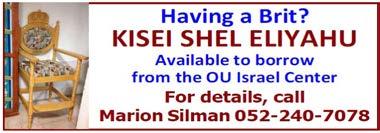

Participation of the couple’s children –Many have the minhag that their children not take part in the chupa (Nitei Gavriel 51:9). The decision should be left to the children (if old enough), without the couple’s pressuring or reading into their decisions.
Sheva Berachot – Sheva Berachot under the chupa are standard, but at meals, it is complicated. The gemara (Ketubot 7a) says that for such a couple there are sheva berachot for only one day. There are three feasible and supported possibilities what one day means (see Rosh, Ketubot 1:13 and its analysis in Chelkat Mechokek 62:6 and Beit Shmuel 62:5): 1) the first meal; 2) any meal eaten the first day; 3) it must be both the first meal and on the first day. The main differences are: A. After a night wedding, can there be a party with the sheva berachot recited the next day? B. If the chupa takes place at the end of the day and the meal takes place at night, are there
berachot at the end of the wedding meal? The general approach is that there is doubt in these test cases, and we do not make berachot in a case of doubt (Beit Shmuel ibid.). Therefore, it is best to time things wisely. The Pitchei Teshuva (ad loc. 10) and Aruch Hashulchan (EH 62:33) cite opinions that if the yichud is at night, then even if the chupa was before, they can recite sheva berachot at night. The Ezer Mikodesh (to EH 62:6) is unsure if this is correct. If the meal was well underway during the day, sheva berachot can be recited at its conclusion at night (Aruch Hashulchan ibid.; Hanisuin K’hilchatam 17:35).
Time together – The couple is supposed to spend happy time together, as opposed to going to work, for three days (Ketubot 7a). The kalla is able to allow the chatan to return to work early (Rama, EH 64:2).
For a Din Torah in English or Hebrew contact ‘Eretz Hemdah - Gazit’ Rabbinical Court: 077215-8-215 • fax: (02) 537-9626 beitdin@eretzhemdah.org

02-560-9125

It’s difficult to part from the book of Bereshit. So here are three ideas taken from it, a little food for thought as we move on to the book of Shemot:
1. The Torah devotes approximately 30 verses to the creation of the physical universe. Yet 1,500 verses are devoted to the creation’s central subject -- the human being. “In the beginning God created the heavens and the earth” -- and the human being. Our principle challenge until today is to be recognized as God’s creations in all we do.
2. It is customary to conclude that the book of Bereshit has a happy ending. Yosef and his brothers are reconciled, Ya’akov Avinu arrives in Egypt, the family reunites. But not all is well. At the end of Bereshit, Ya’akov requests to be buried, sometime in the future, in the Land of Israel and reminds his children: Our exile is temporary since our ultimate destination is the Land of Israel. It’s nice that the family is reunited but we must also reunite with our Homeland. We have a home, and it’s not Egypt.
3. This would appear to be the most influential book of all time. If a poll were taken of the most influential people in human history, Avraham Avinu and


Sarah Imeinu would come out on top. Not because of financial success or military victories or fame; indeed, when they lived, there were empires far more powerful than their household and group of followers, and they were largely anonymous. Yet, until today, they have influenced billions since they founded a family known for its faith, lovingkindness, and radiant light.








Walking down King George St. in Jerusalem and want a cold bottle of water?
Come help yourself to a bottle at 52 King George. In loving memory of Yoni’s wife Tziporah a"h, a true Eishes Chayil, always full of chessed, kindness and laughter, and brought life and strength to so many people, that she touched! She was like Aron, who loved peace and pursued peace. Yoni thanks Hashem for having the opportunity of having Tziporah in his life, to learn of her caring, patience and happiness, to overcome her challenges. May Tziporah's Neshama be a light onto the world, in a time of darkness, and may her Neshama shine to Gan Eden. Yoni misses Tziporah with tears in his eyes, as Hashem gave him a gift, a crown jewel, now he returns her to Hashem. With thanks and Toda. Love, Yoni To help refill the supplysend tax deductible donations for Be’er Tziporah a"h Bottled Water Gemach to Chabad of Rechavia



Last time we discussed the case of Sofia the baby born after the mix up in the fertility clinic. In the meantime, the woman who delivered the baby girl is raising the child together with her husband, even though it is clear that they are not the genetic parents.
We raised the question last time as to whether there is a halachic obligation to continue to search for the father, by performing genetic testing on everyone who underwent treatment in that clinic, since they are all the potential parents. The reason we would promote this is due to the concern that the father is disqualified to marry a Jewish woman, since he is in the halachic category of mamzer which would determine that his children would also not be permitted to marry Jews.
The Ramban (Vayikra 18:20) explains that the reason why the Torah prohibits adultery is that children will be born without knowing who their parents are and terrible situations could arise. The Sefer Hachinuch (Mitzvah 35) elaborates that God wants each being to bear offspring of their own and not that there would be mix
ups and no one would know who their children are.
It appears to be that, according to this explanation, beyond the prohibition of illicit relations, the problem is that children will be born with an unclear lineage. The Satmar Rebbe wrote (Divrei Yoel, Even Haezer 107) we can deduce from this that the halachic status of mamzer is conveyed even if the child was conceived with relations, such as is the case in in-vitro fertilization.
According to this, if Sofia’s father was a mamzer then she would also be a mamzer, as this halachic status was transmitted through the IVF.
However, Rabbi Moshe Feinstein disagreed (Igrot Moshe, Even Haezer Vol. II 11) and proved from other sources that unless there were illicit relations the child is not a mamzer. The Gemara (Chagigah 15a) does discuss a case of conception without relations and the child is considered kosher. Therefore, Rabbi Feinstein was of the opinion that even the genetic father was a mamzer a child conceived through IVF would not be considered a mamzer.
If so, even if the genetic father had a halachically problematic status, Sofia would not inherit this and would be permitted to marry. Accordingly, there is no halachic obligation to continue to search for Sofia’s father, as this has no bearing on her halachic status. More on this next time.










 BY RABBI MOSHE BLOOM en.toraland.org.il
BY RABBI MOSHE BLOOM en.toraland.org.il

Unfortunately, Otzar Ha’aretz will not be providing otzar beit din grape juice this year. There will be a few kinds of otzar beit din wines. We will provide details in future articles. Rabbi Nissim Karelitz’s otzar beit din, however, does offer the holy juice. Mishnat Yosef is the otzar beit din’s main distributor.
The otzar beit din grape juice is 100% natural, without any additives, and is not mevushal (it is pasteurized, though). The juice is truly delicious and natural tasting, the price is excellent (especially in light of the spike in grape juice prices), and it’s holy! They offer red and white grape juice.
Grape juice can be ordered in a box of 9 bottles, (1 L each) at NIS 99 per box (they do not sell individual bottles). According to their website, they have 400 products (including shemitah produce), 249 distribution stations, and approximately 400,000 customers. The delivery arrives at the station once a week at a certain time and needs to be picked up at certain hours.
Note that grape juice is not available every week, but generally every other week. Also then, sometimes there is white grape juice and sometimes red grape juice. So even if
you check their website and it’s not listed, check again the next week and it will hopefully be. Mishnat Yosef delivers primarily, but not exclusively, to haredi areas.
Some of the boxes come with a list of halachic guidelines for the proper care for grape juice with kedushat shevi’it. The majority of these guidelines are identical to those of the rabbis of Otzar Ha’aretz and Torah VeHa’aretz Institute (there are a few minor differences, however).
The website is open for orders only from Thursday till Sunday. Register and order here (you need to register in order to enter the system and see their products): https://new.mishnatyosef.org/
Mechirah LeKehillah, similar to Mishnat Yosef, also distributes shemitah fruit and holy grape juice at cost price as determined by Rabbi Karelitz’s otzar beit din: https://www. sales.org.il/login.aspx. This organization distributes exclusively to haredi areas.

Shenat Hasheva also distributes the same juice in organized group orders. If you are interested in coordinating a group order for your neighborhood or locality (minimum order is 30 boxes), and for additional details, call or send a WhatsApp to this number: 058-6123777.
Soon these three distributors will also be carrying sparkling sweet wine (Moscato).



My teenage daughter demands a lot of my attention. She likes to talk to me but sometimes it’s too much. No matter how much time I give her, she always wants more. I end up feeling drained and losing my patience. Please help me!
M.T.
Michal Silverstein, MS Dear M.T.,
Children demand a lot of their parents and express those needs in different ways. By recognizing the way in which your child needs to receive love will allow you to connect more profoundly and understand the root of her needs. Clearly, the way your child feels full and loved is by spending quality time with you. The fact that your teenage daughter wants to talk to you and spend time with you is a good thing. That connection is an important part of maintaining a good relationship throughout the teenage years. How can you nurture this relationship without feeling drained?
Firstly, having the awareness that this is
Michal Silverstein has a MS in educational psychology and counseling. She facilitates parenting workshops in and around Jerusalem and maintains a private practice.

your child’s particular mode of connection may ease your feelings of being drained. When you listen to your child, it makes her feel loved. It is also important to set boundaries to protect you and your child from this negative cycle. You may want to allot a certain amount for that child. Be consistent and don’t be bullied into feeling guilty if she wants to push the amount of time.
Try to be fully present when you are with her but when the allotted time is up then continue with your other responsibilities. This will teach your child a very important life skill. As she moves through life, she will have to learn to regulate her needs. Also, this will allow you to give happily to your child without the dread of battling for more time. Clear communication and coordinating expectations is essential.
If your daughter is unusually needy, this may be a cry for help. You should ask her if anything else is bothering her. There may be underlying issues such as feeling socially isolated. So it’s important to check in.
Hopefully, these tips will help you enjoy your time together!
Behatzlacha
Feel free to send in any parenting questions you may have to parenting@ouisrael.org (Details will be changed to preserve anonymity).

Last Thursday, early in the morning, a 63-year-old man was riding his bicycle when he began to feel pain in the middle of his chest. The man lost consciousness, collapsed, and fell onto the pavement. As a result of the fall, the man suffered serious head trauma and massive bleeding. Worried eyewitnesses called emergency medical services for help.

Hanan Kadosh, a United Hatzalah volunteer EMT, recently returned from a late night shift at work and had just gotten to bed when his proximity alert went alerting him to the emergency. The incident took place less than 1 km away from Hanan’s home. The dedicated volunteer got back out of bed and immediately got on his ambucycle, and drove to the scene. Hanan was the first responder at the scene.

Hanan initiated chest compressions on the man. As the mobile intensive care ambulance (MICU) arrived, he began to alternate compressions with medical personnel from the MICU. When Hanan wasn’t performing compressions he provided assisted ventilation to the man while the paramedics attached a defibrillator and provided the man with 4 electrical shocks.
The man regained a pulse but was still breathing through assisted ventilation. Hanan bandaged the man’s head injury and attached a cervical collar to his neck to immobilize him and prevent possible cervical spinal cord injuries. After the man was stabilized Hanan and the paramedics checked the man's vital signs, which thankfully were returning to normal. They then put him on a stretcher and the man was transferred to the nearby hospital for further care.
After the incident was over Hanan recounted; ״I’m very glad that today's incident ended successfully. Being an EMT isn’t easy when the patient passes away, it's never obvious the patient will live. I always go above and beyond to try to save an individual's life even when I’m exhausted from my late-night shifts. Today's incident brought me great satisfaction when the man’s pulse returned and he began to regain consciousness. It is for moments like this that I put myself out there as a volunteer and respond to as many emergencies as I can. I hope to visit the man in the hospital in the coming days and check on his situation.”


 Elisheva Wolovitz
Elisheva Wolovitz

The Jewish people throughout history have had this frustrating and definitive pattern whereby we get comfortable in a place, with a certain king or leader, become affluent and successful for a very short period of time and then catastrophe hits. The events of this week’s parsha are a perfect example. The book of Bereishit ends with Yaakov finding his long-lost son, the family is once again united, Yosef has forgiven his brothers and the family have homes, food and the support of Yosef and Pharaoh. And then already in the 8th pasuk of Shemot it says “There arose a new Pharaoh who did not know Joseph.”

Yet, if we look into the next pasuk, we read that Pharaoh says “Look, the Israelite people are much too numerous for us.”
Rabbi Sacks, zt”l, points out that this is the first time the word “ֹוּמַע ” or “people’’ is used in the Torah to describe Bnei Yisrael. Here we see how the whole slavery begins with a reference to one of our strongest qualities, our strength in our community and as a nation. In addition, Rabbi David Fohrman, teaches that the name of this week’s parsha and in fact the whole book, Shemot, is a reference to the connection between the infinite number of stars and the Jewish people.
Therefore, we can see a very powerful message begin to emerge. The Jewish people are not just capable of picking ourselves up and starting again after difficult times, but it is in fact the hard times that initiate our growth as a nation. Is it not one pasuk straight after the next that describes the start of our slavery in a new Pharaoh and then straight away how Bnei Yisrael began to multiply and become “much too numerous” for the great Egyptians?
Each day, in the morning brachot we thank Hashem for blessing “Israel with strength.” We are a strong nation and one of the things that makes us so strong is our ability to thrive not just in the face of, but because of our challenges. Israel is a difficult place and winter is a difficult time especially in Jerusalem! So, going into this week I hope
we can all remember this lesson as the rain leaks into our boots while our bus drives off 2 seconds too early and we forget that we left wet laundry in the machine.


The OU’s Jewish Learning Initiative on Campus (JLIC) is creating and nurturing vibrant religious communities in Israel to support English-speaking college students and young professionals. JLIC Israel’s goals include: building a warm and welcoming Jewish community for students and young professionals; providing engaging and dynamic Jewish education; providing a supportive home environment for Olim; providing resources for personal and religious growth, including personal mentoring, Aliyah support, religious guidance and leadership development. Current JLIC programs in Israel include: Reichman University - Herzliya; Bar Ilan University - Givat Shmuel; Tel Aviv University; Tel Aviv for Young Professionals; and Jerusalem. Contact: Rabbi Jonathan Shulman, Director of OU-JLIC in Israel shulmanj@ou.org





Every superhero has an origin story, describing the events and circumstances that lead them to discover and embrace their powers. There is one figure who stands out as not having an origin story: Moshe.
All we know is that Moshe grew up in Pharaoh’s house. Suddenly he is eighty years old, leading the Exodus as history’s greatest prophet. Why doesn’t Moshe have an origin story?
In standard superhero narratives, we often hear of individuals who gain their powers through some unexpected eventperhaps an accident involving radiation, or an experiment gone awry. These tales serve to underscore the idea that not everyone has the potential to be a superhero, as such events do not happen to everyone.
The Rambam writes (Teshuva 5:2) “every person has the ability to be righteous like Moshe Rabbeinu.” Moshe serves as an example of someone who grew up in the worst possible spiritual and moral circumstances and worked on himself, achieving greatness. The lack of an origin story emphasizes the idea that anyone, regardless of their background or circumstances, can be righteous. We do not have to wait
for something extraordinary to happen to us to become a leader or make a difference.
The true secret to greatness, leadership, and righteousness is not fate, but faith - faith in God and in ourselves. Moshe teaches us that we must take our lives into our own hands and strive for greatness through this faith. Unlike superheroes, we are not simply the objects of fate, but active agents in shaping our own destinies.
Raphael Roshwalb 11th grade, Raanana

Names are superficial labels that are attached to a person, but they are also handles to a person’s essence. When someone is called by their name, they respond as a whole, not just as a certain aspect of their personality.
This is why the portion of the Torah that deals with exile, a state that is foreign to a Jew’s true self, is called “Names” in Hebrew
“More Than Just a Name”
(Shemot). Exile evokes the deepest reserves of a person’s soul, reserves that would otherwise remain hidden.
Rabbi Menachem M. Schneerson, the 3rd Lubavitcher Rebbe know as the Tzemach Tzedek, once shared a story about his grandfather, Rabbi Schneur Zalman of Liadi, and his own childhood. When he was three years old, Menachem Mendel’s mother died, and he was raised by his grandfather. One day, Menachem Mendel was sitting on his grandfather’s lap and pulling on his beard, calling him “Zeideh.” However, Rabbi Schneur Zalman corrected him, saying that the beard was not the zeideh, but rather just a part of him. The child then pointed to his grandfather’s head, eyes, hands, and body, but the

Rebbe kept asking, “Where is zeideh?”
6BR penthouse, 172 m² in authentic building. 4 exps, 3 balconies with view. Spacious rooms. Master BR with en-suite & walk-in closet. Jacuzzi. In central quiet area. Close to cafes, synagogues, Stiebelach, and parks. NIS 7,500,000 - Noa: 052-870-2387
Spacious 4.5BR penthouse, 140m², authentic & preserved building, high ceilings, roof terrace with panoramic view. Pastoral & quiet area, close to the Jerusalem Theater, Emek Refaim, Stiebelach, cafes, parks, and more. NIS 7,600,000 - Noa: 052-870-2387
3BR (2 living rooms!), 138m², on 2nd floor, balcony, 2 baths. Close to everything. Lots of young families in the neighborhood. Very few homes available.
Occupancy: July 2023. NIS 2,050,000 - Mordechai: 052-720-3089
Amazing Tuscan style House, Moshav Luzit
735 m² lot, built 265 m², 60 m² pool, 5 BR, 4.5 bathroom, 20 m² patio. Incl. furniture. Perfect vacation home! Option for rental unit! BBQ, a/c, fireplace, high ceilings. In a pastoral area. Btw Beit Shemesh and Kiryat Gat. NIS 6,350,000 - Noa: 052-870-2387

Finally, Menachem Mendel hid behind the door and called out, “ZEI-DEH!” When his grandfather turned towards him, the child exclaimed, “There is the zeideh!”
This story illustrates that a person’s essence, or true self, is not just their appearance or physical attributes, but rather something that is more abstract and difficult to define.
Every teen throughout his life comes to a point of standstill, a ‘what to do now?’ kind of situation where they get to decide what their name represents and to try to always pick the right choice and further not only their name but the name of Am Yisrael in this world and in the one to come.
Look for us: NOAM HOMES Noam Homes 24 Even Sapir St., Jerusalem 058-793-2222 office@noamhomes.com
Ground floor Apartment, Rechavia, JLM
1.5BR, 60m² (48m² Tabu), fully furnished. Storage unit. Ground floor, private entrance with beautiful yard in use. High ceilings. Underfloor heating. Excellent location near Rehavia, Talbiye, & Kiryat Shmuel neighborhoods. NIS 3,200,000 - Tehila: 050-420-5333
Garden Apartment, Rechavia, JLM
2BR garden apt, 60m² (43m² in Tabu). Yard in exclusive use of about 30m². Newly renovated! Shared storage room. On the sought-after Narkis Street! Perfect location, short walking distance from the city center! NIS 2,830,000 - Tehila: 050-420-5333
Very spacious 3BR apt, 116m², high-level renovation (originally 4BR), new building. 2 bathrooms, central a/c, 3 balconies (22m²), sukkah balcony, storage unit, accessible (elevator), private parking. NIS 3,650,000 - Ouriel: 058-516-1356
Great 2BR apt in all the action. Full of light and fresh air. Excellent location. Well-kept apartment of 45m². Balcony 4m². Storage unit. Rented 4400/month. 4th floor walk-up.
NIS 2,000,000 Mendel: 052-720-3497




